Sustainable Packaging Innovation Trends
VerifiedAdded on 2020/04/01
|18
|5195
|34
AI Summary
This assignment examines current trends and innovations within the field of sustainable packaging. It explores topics such as bio-based materials, intelligent packaging systems, and the impact of consumer behavior on packaging choices. The analysis draws upon academic research articles covering diverse aspects like material science, marketing strategies, and environmental impact assessment related to packaging.
Contribute Materials
Your contribution can guide someone’s learning journey. Share your
documents today.
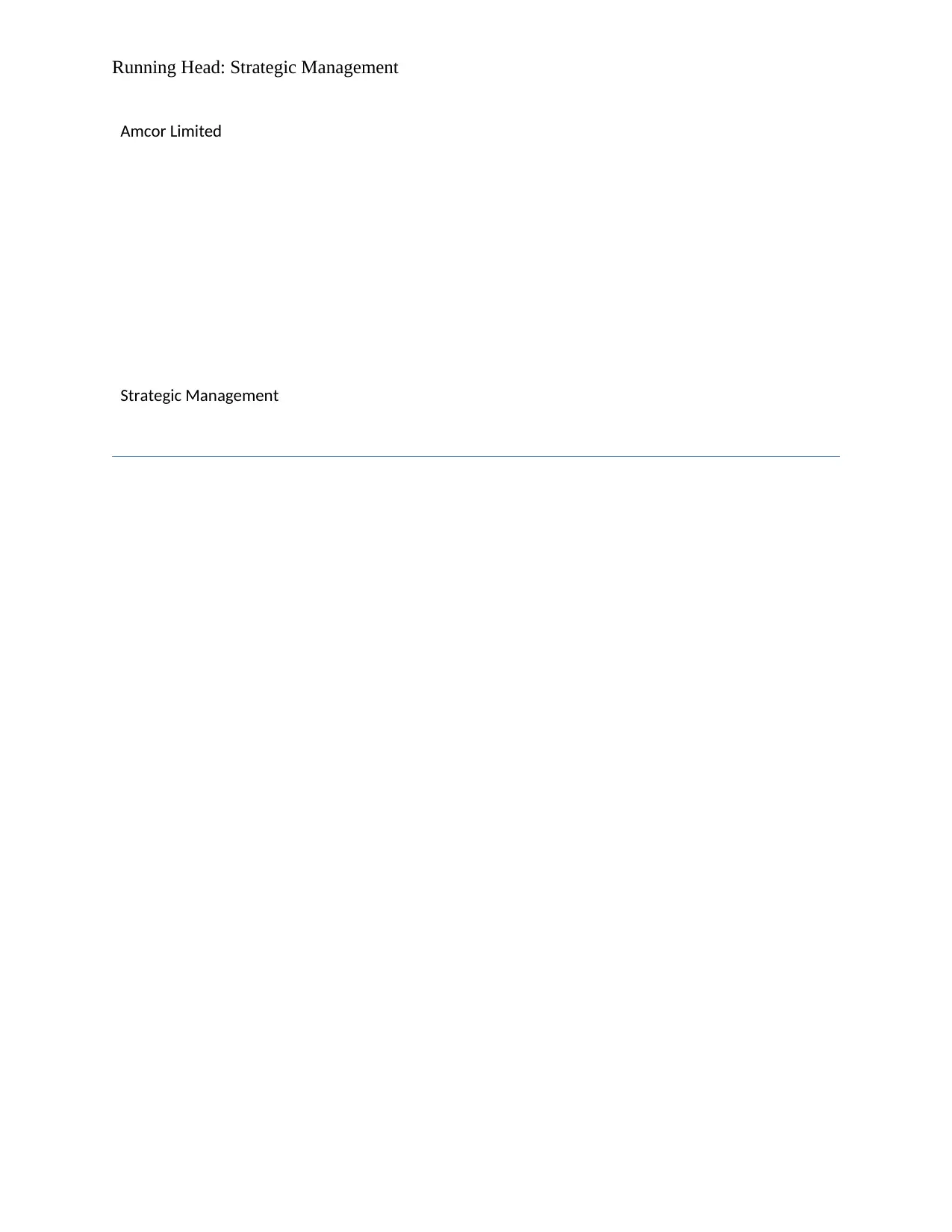
Running Head: Strategic Management
Amcor Limited
Strategic Management
Amcor Limited
Strategic Management
Secure Best Marks with AI Grader
Need help grading? Try our AI Grader for instant feedback on your assignments.
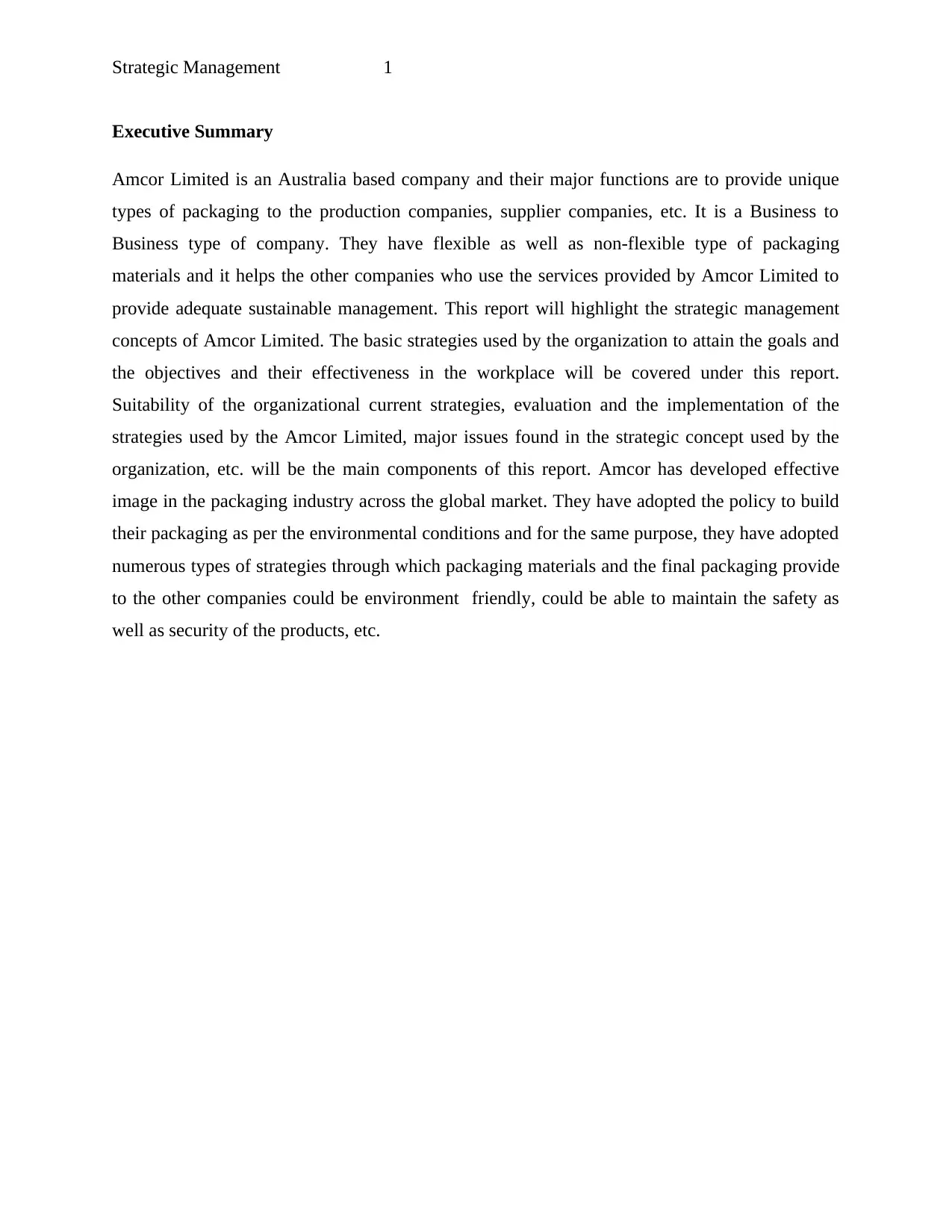
Strategic Management 1
Executive Summary
Amcor Limited is an Australia based company and their major functions are to provide unique
types of packaging to the production companies, supplier companies, etc. It is a Business to
Business type of company. They have flexible as well as non-flexible type of packaging
materials and it helps the other companies who use the services provided by Amcor Limited to
provide adequate sustainable management. This report will highlight the strategic management
concepts of Amcor Limited. The basic strategies used by the organization to attain the goals and
the objectives and their effectiveness in the workplace will be covered under this report.
Suitability of the organizational current strategies, evaluation and the implementation of the
strategies used by the Amcor Limited, major issues found in the strategic concept used by the
organization, etc. will be the main components of this report. Amcor has developed effective
image in the packaging industry across the global market. They have adopted the policy to build
their packaging as per the environmental conditions and for the same purpose, they have adopted
numerous types of strategies through which packaging materials and the final packaging provide
to the other companies could be environment friendly, could be able to maintain the safety as
well as security of the products, etc.
Executive Summary
Amcor Limited is an Australia based company and their major functions are to provide unique
types of packaging to the production companies, supplier companies, etc. It is a Business to
Business type of company. They have flexible as well as non-flexible type of packaging
materials and it helps the other companies who use the services provided by Amcor Limited to
provide adequate sustainable management. This report will highlight the strategic management
concepts of Amcor Limited. The basic strategies used by the organization to attain the goals and
the objectives and their effectiveness in the workplace will be covered under this report.
Suitability of the organizational current strategies, evaluation and the implementation of the
strategies used by the Amcor Limited, major issues found in the strategic concept used by the
organization, etc. will be the main components of this report. Amcor has developed effective
image in the packaging industry across the global market. They have adopted the policy to build
their packaging as per the environmental conditions and for the same purpose, they have adopted
numerous types of strategies through which packaging materials and the final packaging provide
to the other companies could be environment friendly, could be able to maintain the safety as
well as security of the products, etc.
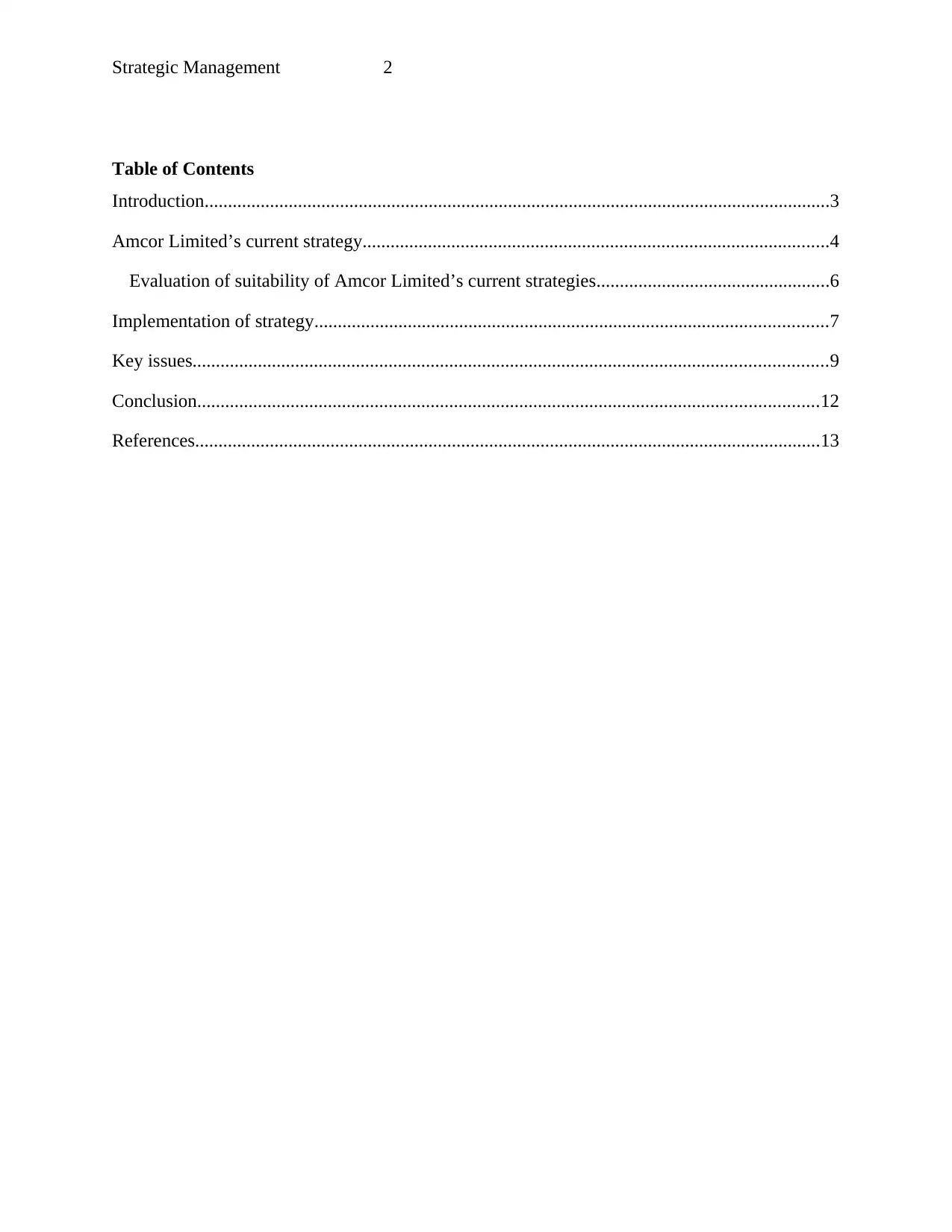
Strategic Management 2
Table of Contents
Introduction......................................................................................................................................3
Amcor Limited’s current strategy....................................................................................................4
Evaluation of suitability of Amcor Limited’s current strategies..................................................6
Implementation of strategy..............................................................................................................7
Key issues........................................................................................................................................9
Conclusion.....................................................................................................................................12
References......................................................................................................................................13
Table of Contents
Introduction......................................................................................................................................3
Amcor Limited’s current strategy....................................................................................................4
Evaluation of suitability of Amcor Limited’s current strategies..................................................6
Implementation of strategy..............................................................................................................7
Key issues........................................................................................................................................9
Conclusion.....................................................................................................................................12
References......................................................................................................................................13
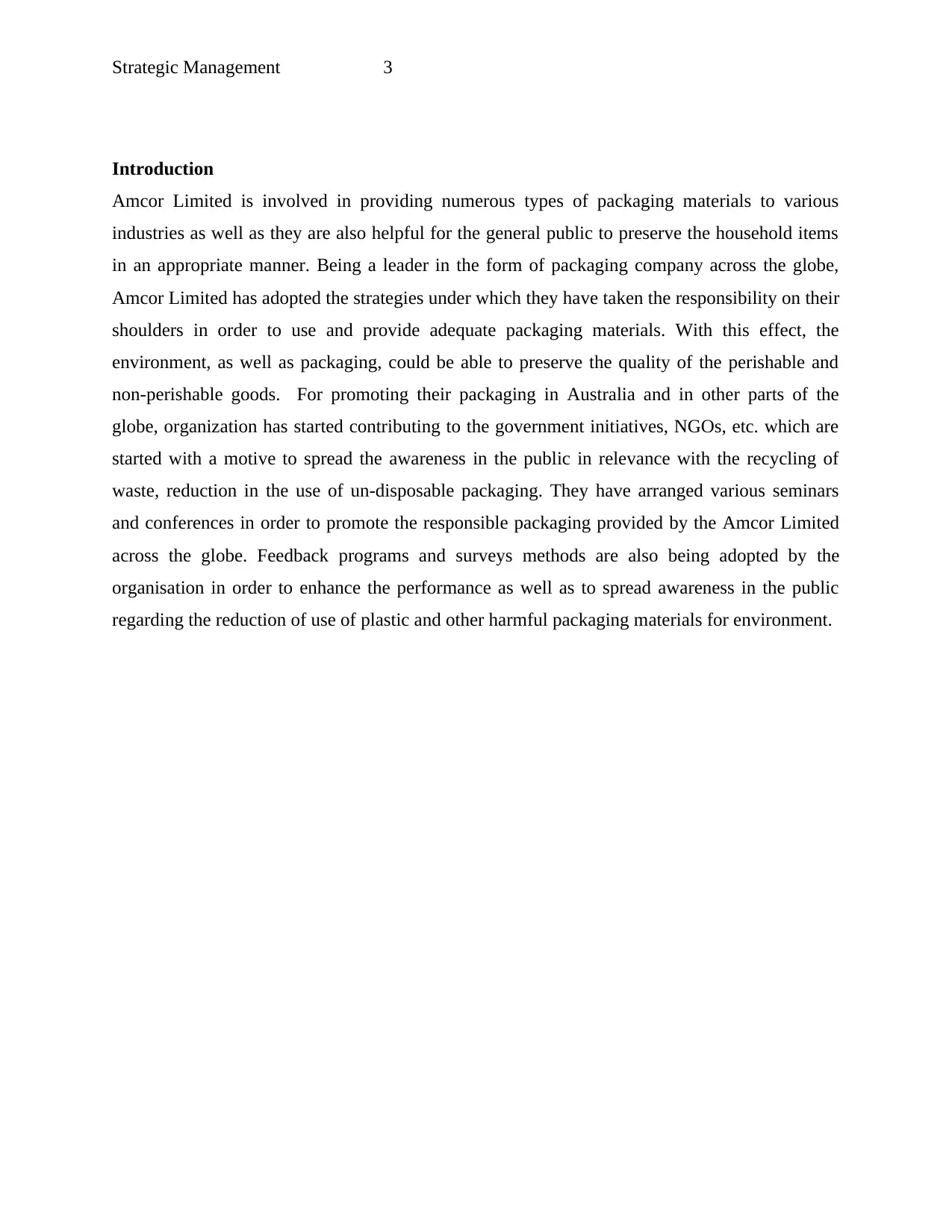
Strategic Management 3
Introduction
Amcor Limited is involved in providing numerous types of packaging materials to various
industries as well as they are also helpful for the general public to preserve the household items
in an appropriate manner. Being a leader in the form of packaging company across the globe,
Amcor Limited has adopted the strategies under which they have taken the responsibility on their
shoulders in order to use and provide adequate packaging materials. With this effect, the
environment, as well as packaging, could be able to preserve the quality of the perishable and
non-perishable goods. For promoting their packaging in Australia and in other parts of the
globe, organization has started contributing to the government initiatives, NGOs, etc. which are
started with a motive to spread the awareness in the public in relevance with the recycling of
waste, reduction in the use of un-disposable packaging. They have arranged various seminars
and conferences in order to promote the responsible packaging provided by the Amcor Limited
across the globe. Feedback programs and surveys methods are also being adopted by the
organisation in order to enhance the performance as well as to spread awareness in the public
regarding the reduction of use of plastic and other harmful packaging materials for environment.
Introduction
Amcor Limited is involved in providing numerous types of packaging materials to various
industries as well as they are also helpful for the general public to preserve the household items
in an appropriate manner. Being a leader in the form of packaging company across the globe,
Amcor Limited has adopted the strategies under which they have taken the responsibility on their
shoulders in order to use and provide adequate packaging materials. With this effect, the
environment, as well as packaging, could be able to preserve the quality of the perishable and
non-perishable goods. For promoting their packaging in Australia and in other parts of the
globe, organization has started contributing to the government initiatives, NGOs, etc. which are
started with a motive to spread the awareness in the public in relevance with the recycling of
waste, reduction in the use of un-disposable packaging. They have arranged various seminars
and conferences in order to promote the responsible packaging provided by the Amcor Limited
across the globe. Feedback programs and surveys methods are also being adopted by the
organisation in order to enhance the performance as well as to spread awareness in the public
regarding the reduction of use of plastic and other harmful packaging materials for environment.
Secure Best Marks with AI Grader
Need help grading? Try our AI Grader for instant feedback on your assignments.
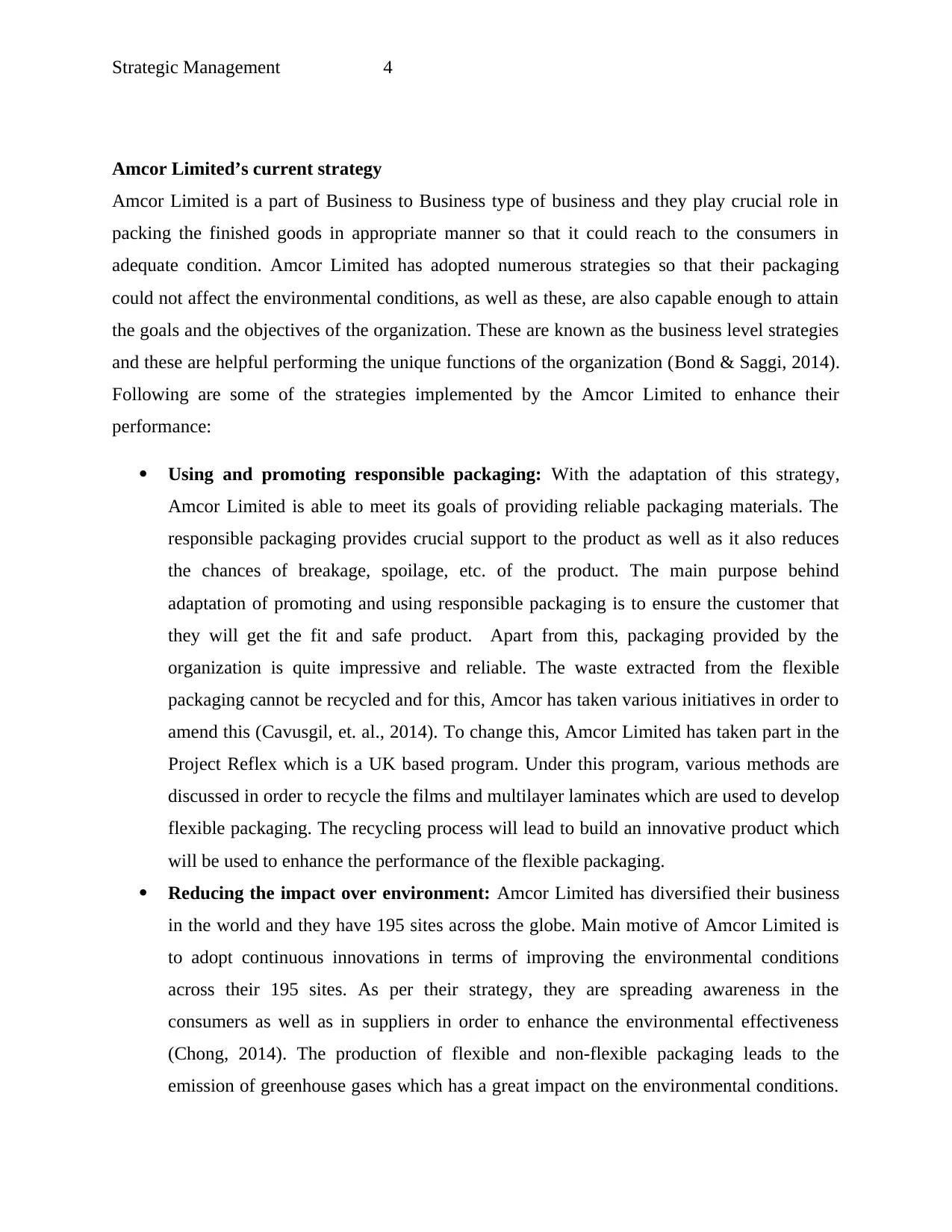
Strategic Management 4
Amcor Limited’s current strategy
Amcor Limited is a part of Business to Business type of business and they play crucial role in
packing the finished goods in appropriate manner so that it could reach to the consumers in
adequate condition. Amcor Limited has adopted numerous strategies so that their packaging
could not affect the environmental conditions, as well as these, are also capable enough to attain
the goals and the objectives of the organization. These are known as the business level strategies
and these are helpful performing the unique functions of the organization (Bond & Saggi, 2014).
Following are some of the strategies implemented by the Amcor Limited to enhance their
performance:
Using and promoting responsible packaging: With the adaptation of this strategy,
Amcor Limited is able to meet its goals of providing reliable packaging materials. The
responsible packaging provides crucial support to the product as well as it also reduces
the chances of breakage, spoilage, etc. of the product. The main purpose behind
adaptation of promoting and using responsible packaging is to ensure the customer that
they will get the fit and safe product. Apart from this, packaging provided by the
organization is quite impressive and reliable. The waste extracted from the flexible
packaging cannot be recycled and for this, Amcor has taken various initiatives in order to
amend this (Cavusgil, et. al., 2014). To change this, Amcor Limited has taken part in the
Project Reflex which is a UK based program. Under this program, various methods are
discussed in order to recycle the films and multilayer laminates which are used to develop
flexible packaging. The recycling process will lead to build an innovative product which
will be used to enhance the performance of the flexible packaging.
Reducing the impact over environment: Amcor Limited has diversified their business
in the world and they have 195 sites across the globe. Main motive of Amcor Limited is
to adopt continuous innovations in terms of improving the environmental conditions
across their 195 sites. As per their strategy, they are spreading awareness in the
consumers as well as in suppliers in order to enhance the environmental effectiveness
(Chong, 2014). The production of flexible and non-flexible packaging leads to the
emission of greenhouse gases which has a great impact on the environmental conditions.
Amcor Limited’s current strategy
Amcor Limited is a part of Business to Business type of business and they play crucial role in
packing the finished goods in appropriate manner so that it could reach to the consumers in
adequate condition. Amcor Limited has adopted numerous strategies so that their packaging
could not affect the environmental conditions, as well as these, are also capable enough to attain
the goals and the objectives of the organization. These are known as the business level strategies
and these are helpful performing the unique functions of the organization (Bond & Saggi, 2014).
Following are some of the strategies implemented by the Amcor Limited to enhance their
performance:
Using and promoting responsible packaging: With the adaptation of this strategy,
Amcor Limited is able to meet its goals of providing reliable packaging materials. The
responsible packaging provides crucial support to the product as well as it also reduces
the chances of breakage, spoilage, etc. of the product. The main purpose behind
adaptation of promoting and using responsible packaging is to ensure the customer that
they will get the fit and safe product. Apart from this, packaging provided by the
organization is quite impressive and reliable. The waste extracted from the flexible
packaging cannot be recycled and for this, Amcor has taken various initiatives in order to
amend this (Cavusgil, et. al., 2014). To change this, Amcor Limited has taken part in the
Project Reflex which is a UK based program. Under this program, various methods are
discussed in order to recycle the films and multilayer laminates which are used to develop
flexible packaging. The recycling process will lead to build an innovative product which
will be used to enhance the performance of the flexible packaging.
Reducing the impact over environment: Amcor Limited has diversified their business
in the world and they have 195 sites across the globe. Main motive of Amcor Limited is
to adopt continuous innovations in terms of improving the environmental conditions
across their 195 sites. As per their strategy, they are spreading awareness in the
consumers as well as in suppliers in order to enhance the environmental effectiveness
(Chong, 2014). The production of flexible and non-flexible packaging leads to the
emission of greenhouse gases which has a great impact on the environmental conditions.
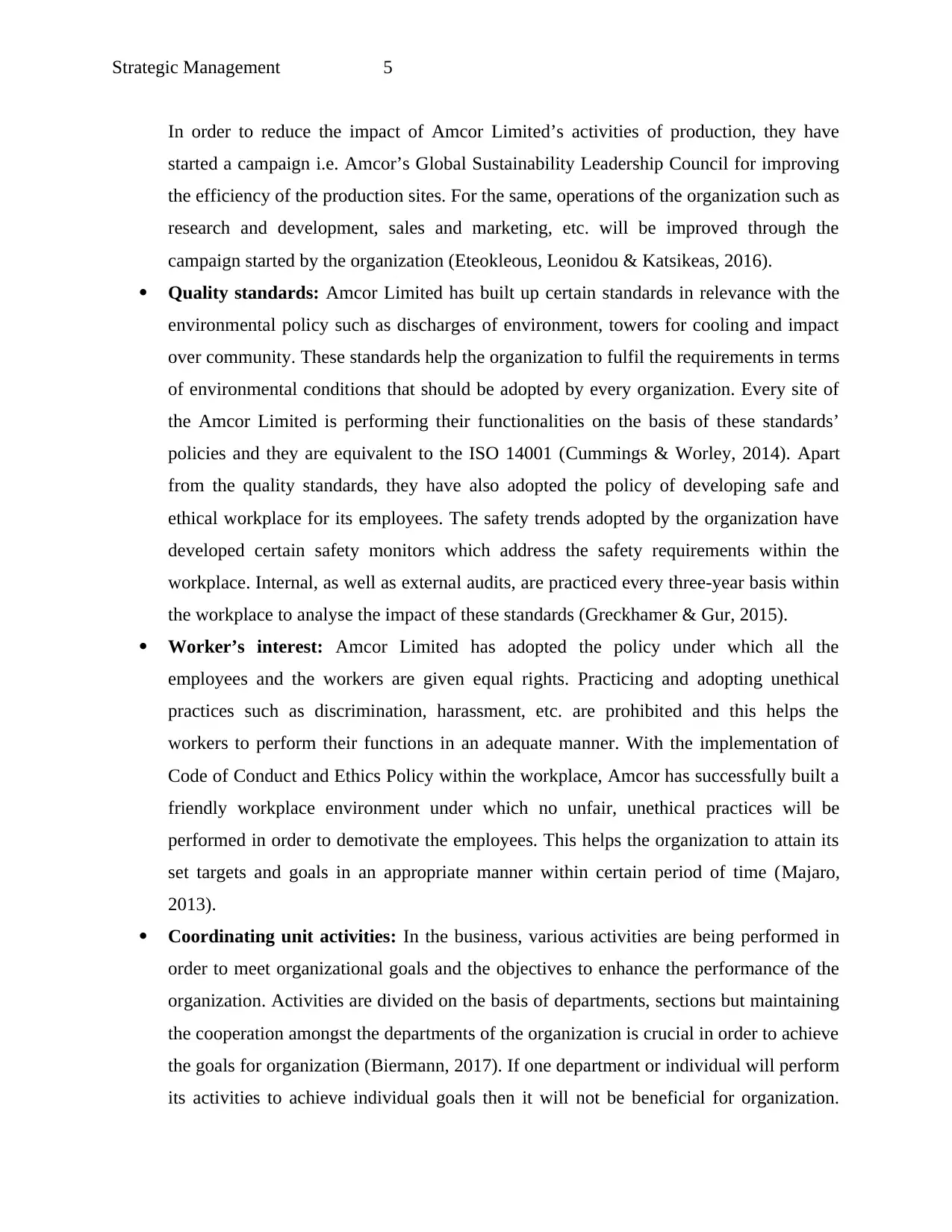
Strategic Management 5
In order to reduce the impact of Amcor Limited’s activities of production, they have
started a campaign i.e. Amcor’s Global Sustainability Leadership Council for improving
the efficiency of the production sites. For the same, operations of the organization such as
research and development, sales and marketing, etc. will be improved through the
campaign started by the organization (Eteokleous, Leonidou & Katsikeas, 2016).
Quality standards: Amcor Limited has built up certain standards in relevance with the
environmental policy such as discharges of environment, towers for cooling and impact
over community. These standards help the organization to fulfil the requirements in terms
of environmental conditions that should be adopted by every organization. Every site of
the Amcor Limited is performing their functionalities on the basis of these standards’
policies and they are equivalent to the ISO 14001 (Cummings & Worley, 2014). Apart
from the quality standards, they have also adopted the policy of developing safe and
ethical workplace for its employees. The safety trends adopted by the organization have
developed certain safety monitors which address the safety requirements within the
workplace. Internal, as well as external audits, are practiced every three-year basis within
the workplace to analyse the impact of these standards (Greckhamer & Gur, 2015).
Worker’s interest: Amcor Limited has adopted the policy under which all the
employees and the workers are given equal rights. Practicing and adopting unethical
practices such as discrimination, harassment, etc. are prohibited and this helps the
workers to perform their functions in an adequate manner. With the implementation of
Code of Conduct and Ethics Policy within the workplace, Amcor has successfully built a
friendly workplace environment under which no unfair, unethical practices will be
performed in order to demotivate the employees. This helps the organization to attain its
set targets and goals in an appropriate manner within certain period of time (Majaro,
2013).
Coordinating unit activities: In the business, various activities are being performed in
order to meet organizational goals and the objectives to enhance the performance of the
organization. Activities are divided on the basis of departments, sections but maintaining
the cooperation amongst the departments of the organization is crucial in order to achieve
the goals for organization (Biermann, 2017). If one department or individual will perform
its activities to achieve individual goals then it will not be beneficial for organization.
In order to reduce the impact of Amcor Limited’s activities of production, they have
started a campaign i.e. Amcor’s Global Sustainability Leadership Council for improving
the efficiency of the production sites. For the same, operations of the organization such as
research and development, sales and marketing, etc. will be improved through the
campaign started by the organization (Eteokleous, Leonidou & Katsikeas, 2016).
Quality standards: Amcor Limited has built up certain standards in relevance with the
environmental policy such as discharges of environment, towers for cooling and impact
over community. These standards help the organization to fulfil the requirements in terms
of environmental conditions that should be adopted by every organization. Every site of
the Amcor Limited is performing their functionalities on the basis of these standards’
policies and they are equivalent to the ISO 14001 (Cummings & Worley, 2014). Apart
from the quality standards, they have also adopted the policy of developing safe and
ethical workplace for its employees. The safety trends adopted by the organization have
developed certain safety monitors which address the safety requirements within the
workplace. Internal, as well as external audits, are practiced every three-year basis within
the workplace to analyse the impact of these standards (Greckhamer & Gur, 2015).
Worker’s interest: Amcor Limited has adopted the policy under which all the
employees and the workers are given equal rights. Practicing and adopting unethical
practices such as discrimination, harassment, etc. are prohibited and this helps the
workers to perform their functions in an adequate manner. With the implementation of
Code of Conduct and Ethics Policy within the workplace, Amcor has successfully built a
friendly workplace environment under which no unfair, unethical practices will be
performed in order to demotivate the employees. This helps the organization to attain its
set targets and goals in an appropriate manner within certain period of time (Majaro,
2013).
Coordinating unit activities: In the business, various activities are being performed in
order to meet organizational goals and the objectives to enhance the performance of the
organization. Activities are divided on the basis of departments, sections but maintaining
the cooperation amongst the departments of the organization is crucial in order to achieve
the goals for organization (Biermann, 2017). If one department or individual will perform
its activities to achieve individual goals then it will not be beneficial for organization.
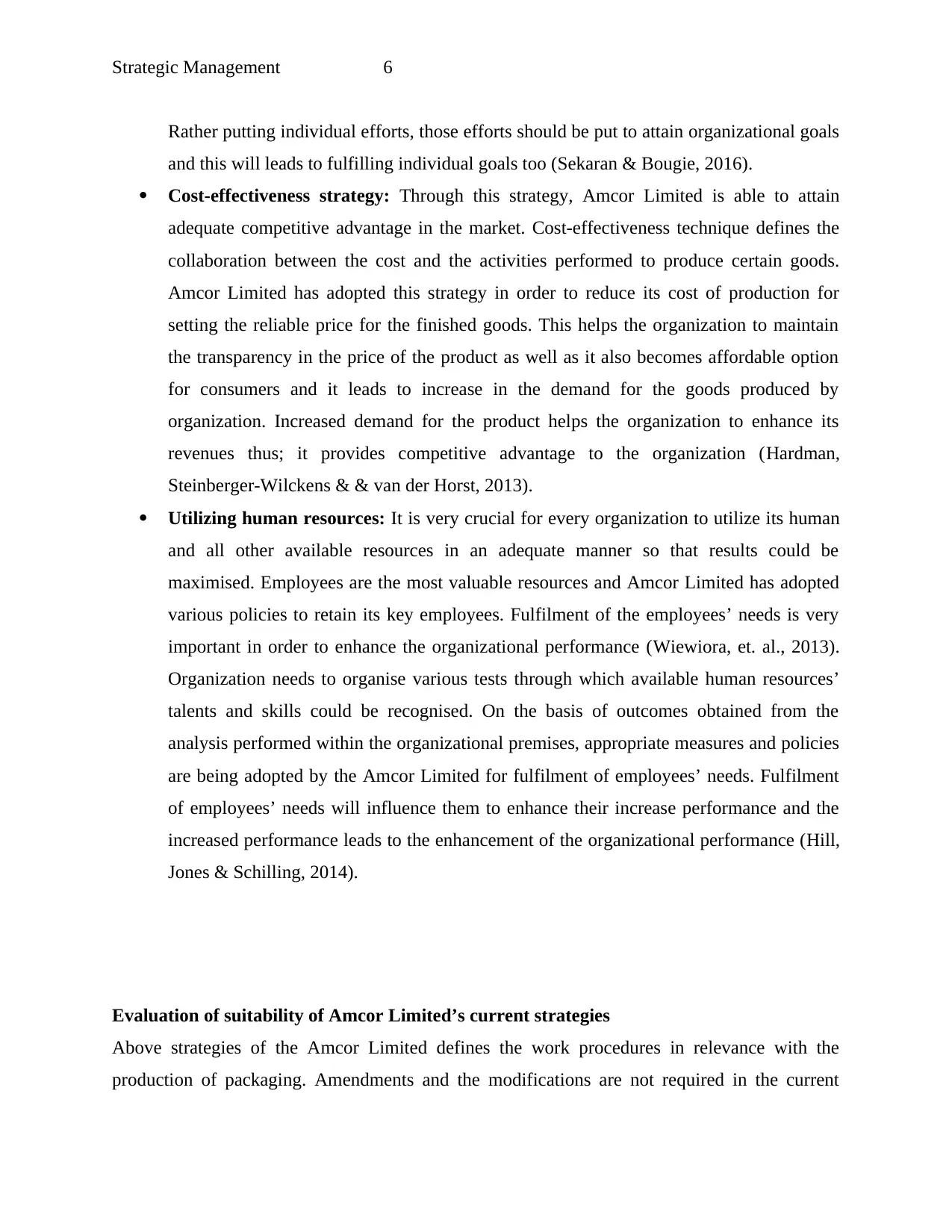
Strategic Management 6
Rather putting individual efforts, those efforts should be put to attain organizational goals
and this will leads to fulfilling individual goals too (Sekaran & Bougie, 2016).
Cost-effectiveness strategy: Through this strategy, Amcor Limited is able to attain
adequate competitive advantage in the market. Cost-effectiveness technique defines the
collaboration between the cost and the activities performed to produce certain goods.
Amcor Limited has adopted this strategy in order to reduce its cost of production for
setting the reliable price for the finished goods. This helps the organization to maintain
the transparency in the price of the product as well as it also becomes affordable option
for consumers and it leads to increase in the demand for the goods produced by
organization. Increased demand for the product helps the organization to enhance its
revenues thus; it provides competitive advantage to the organization (Hardman,
Steinberger-Wilckens & & van der Horst, 2013).
Utilizing human resources: It is very crucial for every organization to utilize its human
and all other available resources in an adequate manner so that results could be
maximised. Employees are the most valuable resources and Amcor Limited has adopted
various policies to retain its key employees. Fulfilment of the employees’ needs is very
important in order to enhance the organizational performance (Wiewiora, et. al., 2013).
Organization needs to organise various tests through which available human resources’
talents and skills could be recognised. On the basis of outcomes obtained from the
analysis performed within the organizational premises, appropriate measures and policies
are being adopted by the Amcor Limited for fulfilment of employees’ needs. Fulfilment
of employees’ needs will influence them to enhance their increase performance and the
increased performance leads to the enhancement of the organizational performance (Hill,
Jones & Schilling, 2014).
Evaluation of suitability of Amcor Limited’s current strategies
Above strategies of the Amcor Limited defines the work procedures in relevance with the
production of packaging. Amendments and the modifications are not required in the current
Rather putting individual efforts, those efforts should be put to attain organizational goals
and this will leads to fulfilling individual goals too (Sekaran & Bougie, 2016).
Cost-effectiveness strategy: Through this strategy, Amcor Limited is able to attain
adequate competitive advantage in the market. Cost-effectiveness technique defines the
collaboration between the cost and the activities performed to produce certain goods.
Amcor Limited has adopted this strategy in order to reduce its cost of production for
setting the reliable price for the finished goods. This helps the organization to maintain
the transparency in the price of the product as well as it also becomes affordable option
for consumers and it leads to increase in the demand for the goods produced by
organization. Increased demand for the product helps the organization to enhance its
revenues thus; it provides competitive advantage to the organization (Hardman,
Steinberger-Wilckens & & van der Horst, 2013).
Utilizing human resources: It is very crucial for every organization to utilize its human
and all other available resources in an adequate manner so that results could be
maximised. Employees are the most valuable resources and Amcor Limited has adopted
various policies to retain its key employees. Fulfilment of the employees’ needs is very
important in order to enhance the organizational performance (Wiewiora, et. al., 2013).
Organization needs to organise various tests through which available human resources’
talents and skills could be recognised. On the basis of outcomes obtained from the
analysis performed within the organizational premises, appropriate measures and policies
are being adopted by the Amcor Limited for fulfilment of employees’ needs. Fulfilment
of employees’ needs will influence them to enhance their increase performance and the
increased performance leads to the enhancement of the organizational performance (Hill,
Jones & Schilling, 2014).
Evaluation of suitability of Amcor Limited’s current strategies
Above strategies of the Amcor Limited defines the work procedures in relevance with the
production of packaging. Amendments and the modifications are not required in the current
Paraphrase This Document
Need a fresh take? Get an instant paraphrase of this document with our AI Paraphraser
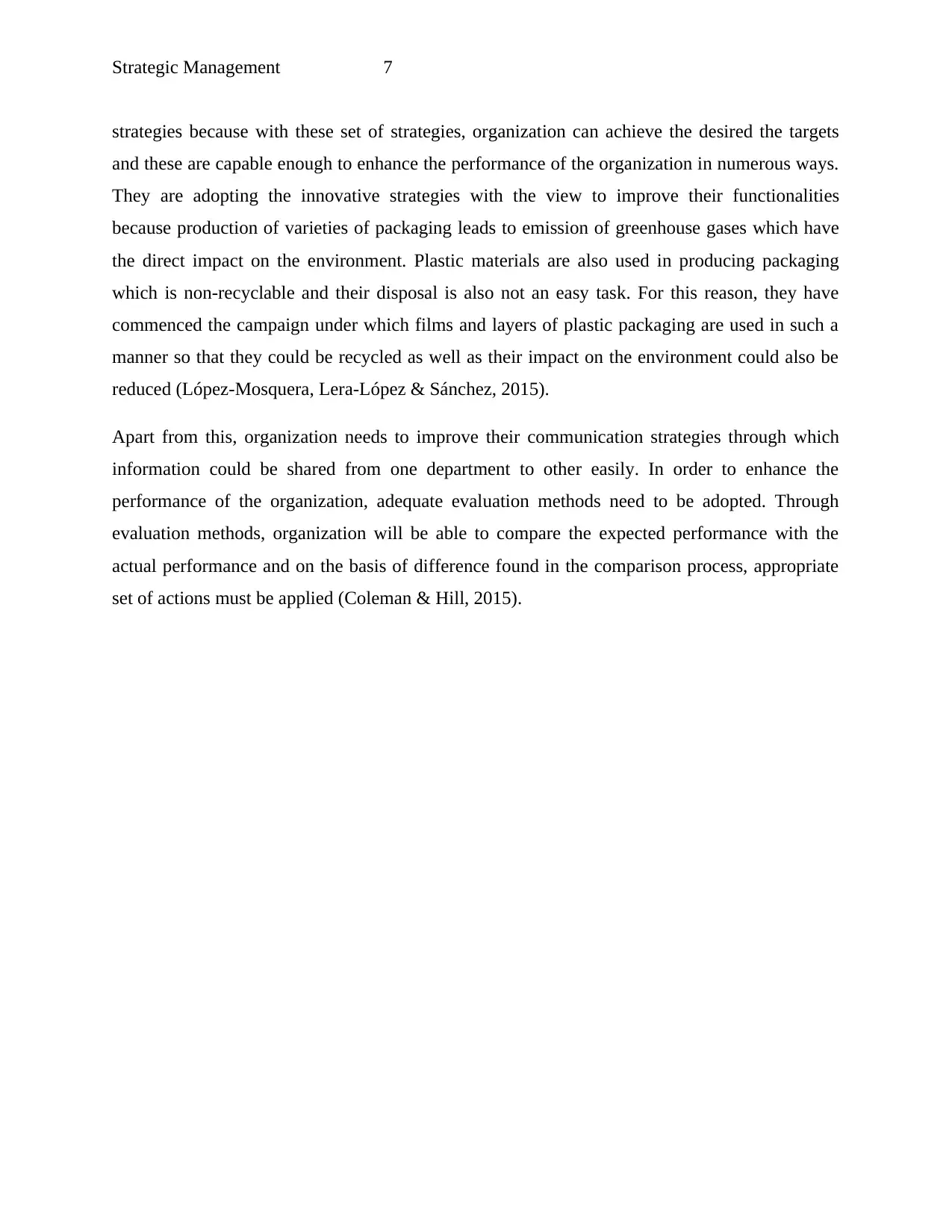
Strategic Management 7
strategies because with these set of strategies, organization can achieve the desired the targets
and these are capable enough to enhance the performance of the organization in numerous ways.
They are adopting the innovative strategies with the view to improve their functionalities
because production of varieties of packaging leads to emission of greenhouse gases which have
the direct impact on the environment. Plastic materials are also used in producing packaging
which is non-recyclable and their disposal is also not an easy task. For this reason, they have
commenced the campaign under which films and layers of plastic packaging are used in such a
manner so that they could be recycled as well as their impact on the environment could also be
reduced (López-Mosquera, Lera-López & Sánchez, 2015).
Apart from this, organization needs to improve their communication strategies through which
information could be shared from one department to other easily. In order to enhance the
performance of the organization, adequate evaluation methods need to be adopted. Through
evaluation methods, organization will be able to compare the expected performance with the
actual performance and on the basis of difference found in the comparison process, appropriate
set of actions must be applied (Coleman & Hill, 2015).
strategies because with these set of strategies, organization can achieve the desired the targets
and these are capable enough to enhance the performance of the organization in numerous ways.
They are adopting the innovative strategies with the view to improve their functionalities
because production of varieties of packaging leads to emission of greenhouse gases which have
the direct impact on the environment. Plastic materials are also used in producing packaging
which is non-recyclable and their disposal is also not an easy task. For this reason, they have
commenced the campaign under which films and layers of plastic packaging are used in such a
manner so that they could be recycled as well as their impact on the environment could also be
reduced (López-Mosquera, Lera-López & Sánchez, 2015).
Apart from this, organization needs to improve their communication strategies through which
information could be shared from one department to other easily. In order to enhance the
performance of the organization, adequate evaluation methods need to be adopted. Through
evaluation methods, organization will be able to compare the expected performance with the
actual performance and on the basis of difference found in the comparison process, appropriate
set of actions must be applied (Coleman & Hill, 2015).
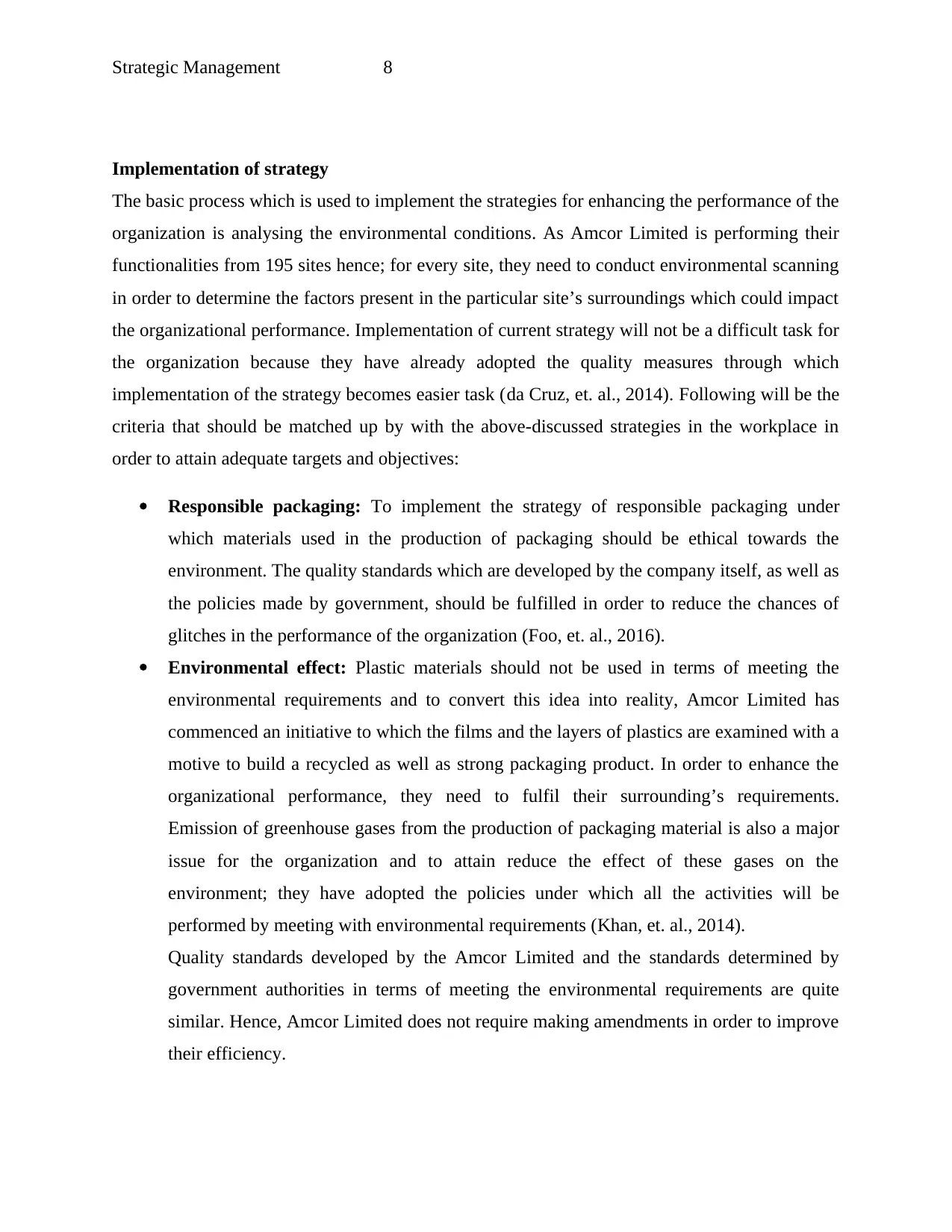
Strategic Management 8
Implementation of strategy
The basic process which is used to implement the strategies for enhancing the performance of the
organization is analysing the environmental conditions. As Amcor Limited is performing their
functionalities from 195 sites hence; for every site, they need to conduct environmental scanning
in order to determine the factors present in the particular site’s surroundings which could impact
the organizational performance. Implementation of current strategy will not be a difficult task for
the organization because they have already adopted the quality measures through which
implementation of the strategy becomes easier task (da Cruz, et. al., 2014). Following will be the
criteria that should be matched up by with the above-discussed strategies in the workplace in
order to attain adequate targets and objectives:
Responsible packaging: To implement the strategy of responsible packaging under
which materials used in the production of packaging should be ethical towards the
environment. The quality standards which are developed by the company itself, as well as
the policies made by government, should be fulfilled in order to reduce the chances of
glitches in the performance of the organization (Foo, et. al., 2016).
Environmental effect: Plastic materials should not be used in terms of meeting the
environmental requirements and to convert this idea into reality, Amcor Limited has
commenced an initiative to which the films and the layers of plastics are examined with a
motive to build a recycled as well as strong packaging product. In order to enhance the
organizational performance, they need to fulfil their surrounding’s requirements.
Emission of greenhouse gases from the production of packaging material is also a major
issue for the organization and to attain reduce the effect of these gases on the
environment; they have adopted the policies under which all the activities will be
performed by meeting with environmental requirements (Khan, et. al., 2014).
Quality standards developed by the Amcor Limited and the standards determined by
government authorities in terms of meeting the environmental requirements are quite
similar. Hence, Amcor Limited does not require making amendments in order to improve
their efficiency.
Implementation of strategy
The basic process which is used to implement the strategies for enhancing the performance of the
organization is analysing the environmental conditions. As Amcor Limited is performing their
functionalities from 195 sites hence; for every site, they need to conduct environmental scanning
in order to determine the factors present in the particular site’s surroundings which could impact
the organizational performance. Implementation of current strategy will not be a difficult task for
the organization because they have already adopted the quality measures through which
implementation of the strategy becomes easier task (da Cruz, et. al., 2014). Following will be the
criteria that should be matched up by with the above-discussed strategies in the workplace in
order to attain adequate targets and objectives:
Responsible packaging: To implement the strategy of responsible packaging under
which materials used in the production of packaging should be ethical towards the
environment. The quality standards which are developed by the company itself, as well as
the policies made by government, should be fulfilled in order to reduce the chances of
glitches in the performance of the organization (Foo, et. al., 2016).
Environmental effect: Plastic materials should not be used in terms of meeting the
environmental requirements and to convert this idea into reality, Amcor Limited has
commenced an initiative to which the films and the layers of plastics are examined with a
motive to build a recycled as well as strong packaging product. In order to enhance the
organizational performance, they need to fulfil their surrounding’s requirements.
Emission of greenhouse gases from the production of packaging material is also a major
issue for the organization and to attain reduce the effect of these gases on the
environment; they have adopted the policies under which all the activities will be
performed by meeting with environmental requirements (Khan, et. al., 2014).
Quality standards developed by the Amcor Limited and the standards determined by
government authorities in terms of meeting the environmental requirements are quite
similar. Hence, Amcor Limited does not require making amendments in order to improve
their efficiency.
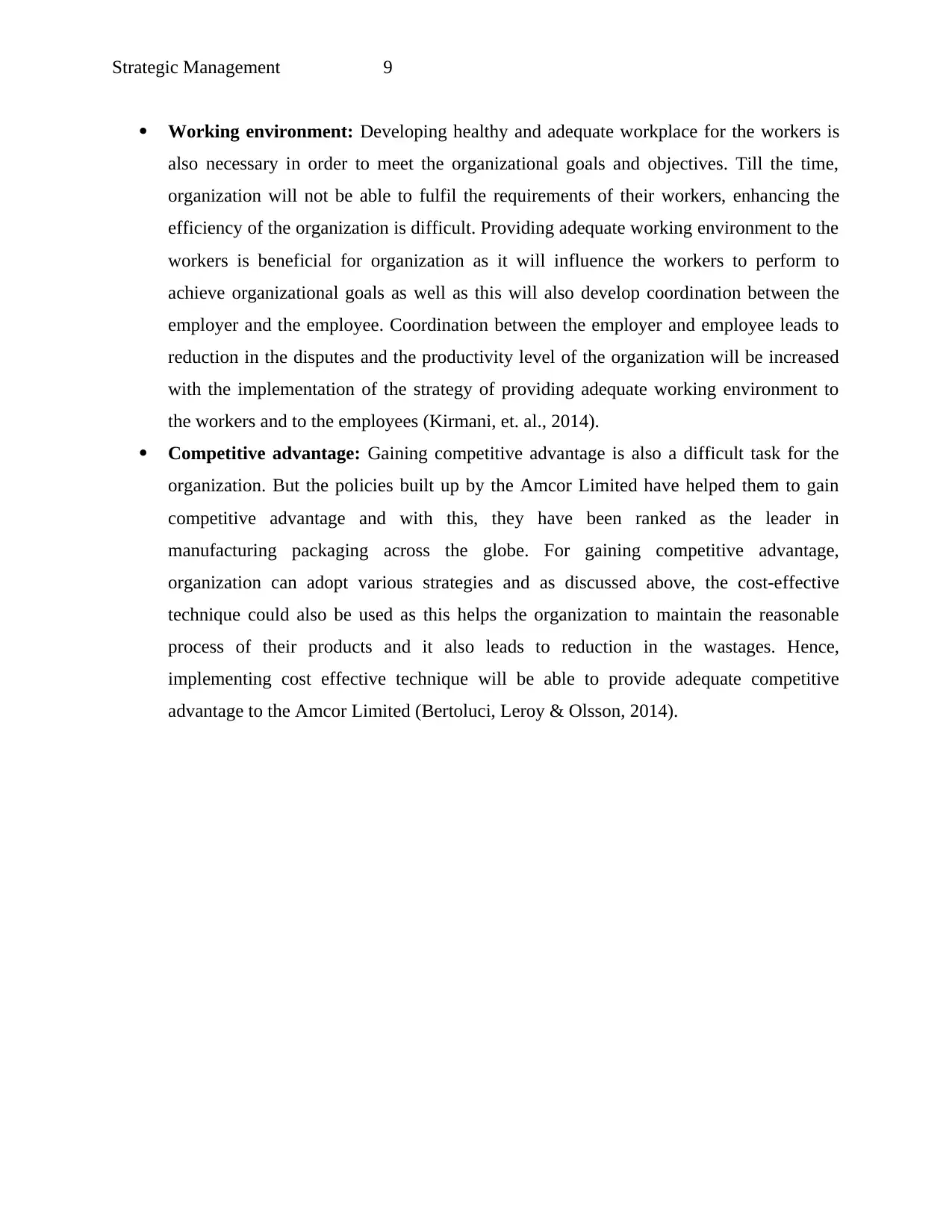
Strategic Management 9
Working environment: Developing healthy and adequate workplace for the workers is
also necessary in order to meet the organizational goals and objectives. Till the time,
organization will not be able to fulfil the requirements of their workers, enhancing the
efficiency of the organization is difficult. Providing adequate working environment to the
workers is beneficial for organization as it will influence the workers to perform to
achieve organizational goals as well as this will also develop coordination between the
employer and the employee. Coordination between the employer and employee leads to
reduction in the disputes and the productivity level of the organization will be increased
with the implementation of the strategy of providing adequate working environment to
the workers and to the employees (Kirmani, et. al., 2014).
Competitive advantage: Gaining competitive advantage is also a difficult task for the
organization. But the policies built up by the Amcor Limited have helped them to gain
competitive advantage and with this, they have been ranked as the leader in
manufacturing packaging across the globe. For gaining competitive advantage,
organization can adopt various strategies and as discussed above, the cost-effective
technique could also be used as this helps the organization to maintain the reasonable
process of their products and it also leads to reduction in the wastages. Hence,
implementing cost effective technique will be able to provide adequate competitive
advantage to the Amcor Limited (Bertoluci, Leroy & Olsson, 2014).
Working environment: Developing healthy and adequate workplace for the workers is
also necessary in order to meet the organizational goals and objectives. Till the time,
organization will not be able to fulfil the requirements of their workers, enhancing the
efficiency of the organization is difficult. Providing adequate working environment to the
workers is beneficial for organization as it will influence the workers to perform to
achieve organizational goals as well as this will also develop coordination between the
employer and the employee. Coordination between the employer and employee leads to
reduction in the disputes and the productivity level of the organization will be increased
with the implementation of the strategy of providing adequate working environment to
the workers and to the employees (Kirmani, et. al., 2014).
Competitive advantage: Gaining competitive advantage is also a difficult task for the
organization. But the policies built up by the Amcor Limited have helped them to gain
competitive advantage and with this, they have been ranked as the leader in
manufacturing packaging across the globe. For gaining competitive advantage,
organization can adopt various strategies and as discussed above, the cost-effective
technique could also be used as this helps the organization to maintain the reasonable
process of their products and it also leads to reduction in the wastages. Hence,
implementing cost effective technique will be able to provide adequate competitive
advantage to the Amcor Limited (Bertoluci, Leroy & Olsson, 2014).
Secure Best Marks with AI Grader
Need help grading? Try our AI Grader for instant feedback on your assignments.
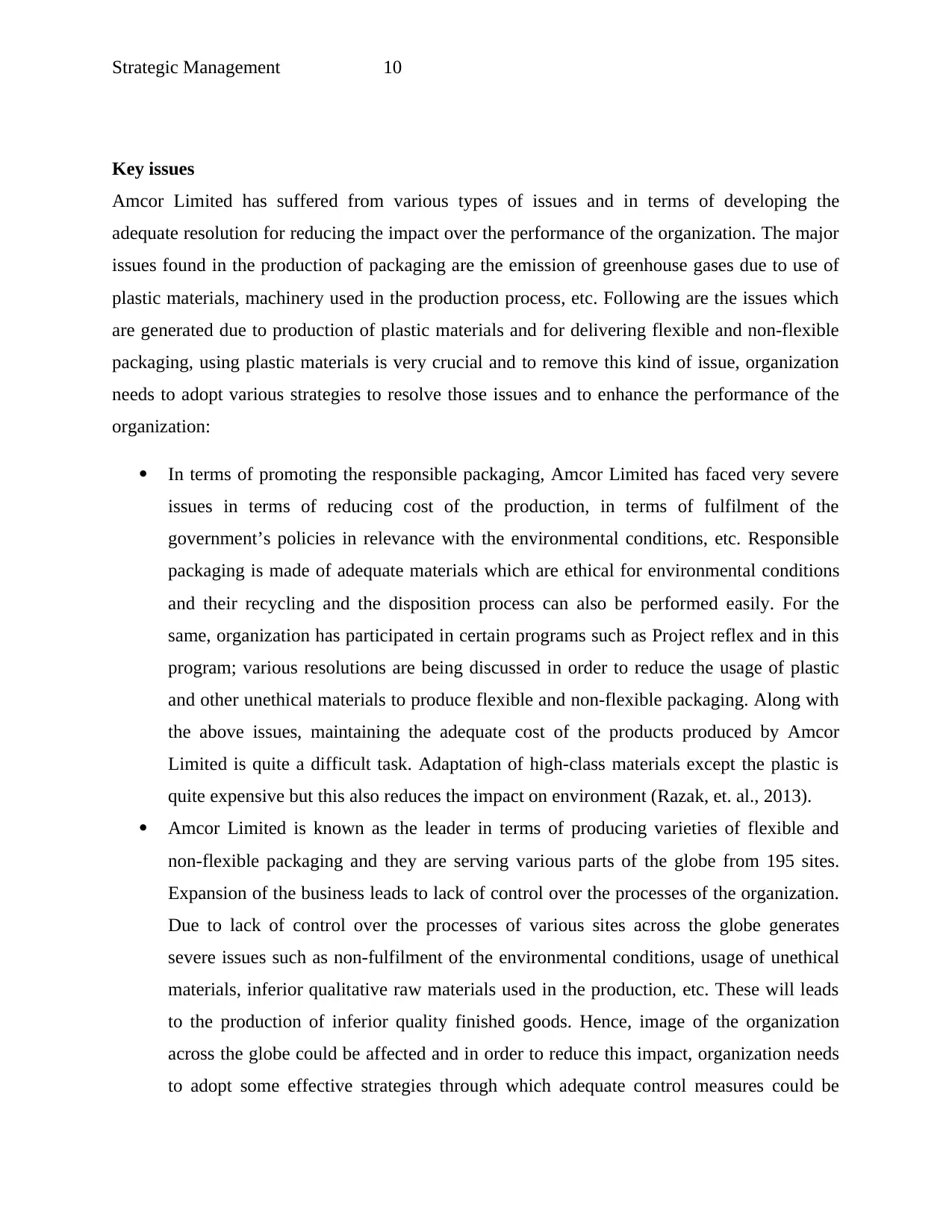
Strategic Management 10
Key issues
Amcor Limited has suffered from various types of issues and in terms of developing the
adequate resolution for reducing the impact over the performance of the organization. The major
issues found in the production of packaging are the emission of greenhouse gases due to use of
plastic materials, machinery used in the production process, etc. Following are the issues which
are generated due to production of plastic materials and for delivering flexible and non-flexible
packaging, using plastic materials is very crucial and to remove this kind of issue, organization
needs to adopt various strategies to resolve those issues and to enhance the performance of the
organization:
In terms of promoting the responsible packaging, Amcor Limited has faced very severe
issues in terms of reducing cost of the production, in terms of fulfilment of the
government’s policies in relevance with the environmental conditions, etc. Responsible
packaging is made of adequate materials which are ethical for environmental conditions
and their recycling and the disposition process can also be performed easily. For the
same, organization has participated in certain programs such as Project reflex and in this
program; various resolutions are being discussed in order to reduce the usage of plastic
and other unethical materials to produce flexible and non-flexible packaging. Along with
the above issues, maintaining the adequate cost of the products produced by Amcor
Limited is quite a difficult task. Adaptation of high-class materials except the plastic is
quite expensive but this also reduces the impact on environment (Razak, et. al., 2013).
Amcor Limited is known as the leader in terms of producing varieties of flexible and
non-flexible packaging and they are serving various parts of the globe from 195 sites.
Expansion of the business leads to lack of control over the processes of the organization.
Due to lack of control over the processes of various sites across the globe generates
severe issues such as non-fulfilment of the environmental conditions, usage of unethical
materials, inferior qualitative raw materials used in the production, etc. These will leads
to the production of inferior quality finished goods. Hence, image of the organization
across the globe could be affected and in order to reduce this impact, organization needs
to adopt some effective strategies through which adequate control measures could be
Key issues
Amcor Limited has suffered from various types of issues and in terms of developing the
adequate resolution for reducing the impact over the performance of the organization. The major
issues found in the production of packaging are the emission of greenhouse gases due to use of
plastic materials, machinery used in the production process, etc. Following are the issues which
are generated due to production of plastic materials and for delivering flexible and non-flexible
packaging, using plastic materials is very crucial and to remove this kind of issue, organization
needs to adopt various strategies to resolve those issues and to enhance the performance of the
organization:
In terms of promoting the responsible packaging, Amcor Limited has faced very severe
issues in terms of reducing cost of the production, in terms of fulfilment of the
government’s policies in relevance with the environmental conditions, etc. Responsible
packaging is made of adequate materials which are ethical for environmental conditions
and their recycling and the disposition process can also be performed easily. For the
same, organization has participated in certain programs such as Project reflex and in this
program; various resolutions are being discussed in order to reduce the usage of plastic
and other unethical materials to produce flexible and non-flexible packaging. Along with
the above issues, maintaining the adequate cost of the products produced by Amcor
Limited is quite a difficult task. Adaptation of high-class materials except the plastic is
quite expensive but this also reduces the impact on environment (Razak, et. al., 2013).
Amcor Limited is known as the leader in terms of producing varieties of flexible and
non-flexible packaging and they are serving various parts of the globe from 195 sites.
Expansion of the business leads to lack of control over the processes of the organization.
Due to lack of control over the processes of various sites across the globe generates
severe issues such as non-fulfilment of the environmental conditions, usage of unethical
materials, inferior qualitative raw materials used in the production, etc. These will leads
to the production of inferior quality finished goods. Hence, image of the organization
across the globe could be affected and in order to reduce this impact, organization needs
to adopt some effective strategies through which adequate control measures could be
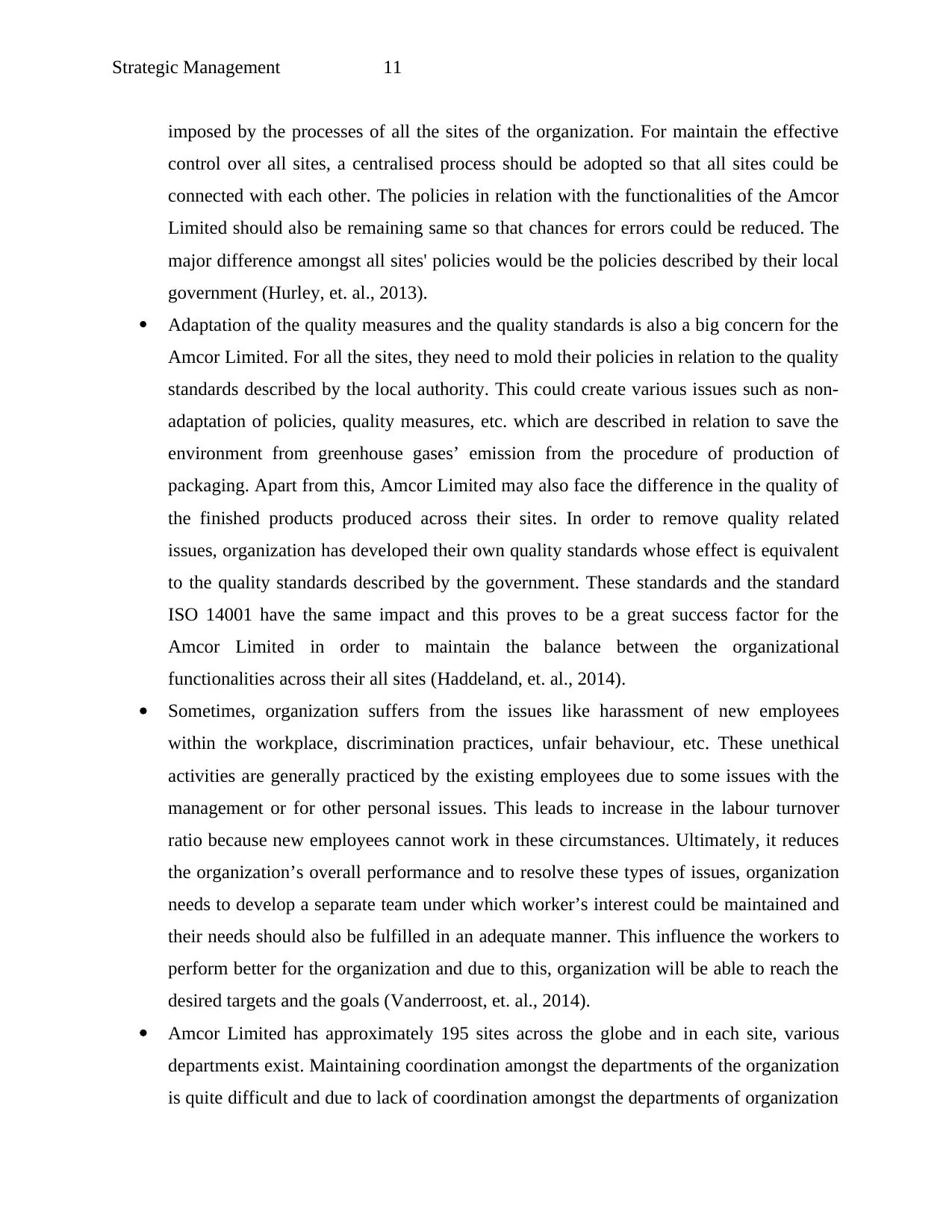
Strategic Management 11
imposed by the processes of all the sites of the organization. For maintain the effective
control over all sites, a centralised process should be adopted so that all sites could be
connected with each other. The policies in relation with the functionalities of the Amcor
Limited should also be remaining same so that chances for errors could be reduced. The
major difference amongst all sites' policies would be the policies described by their local
government (Hurley, et. al., 2013).
Adaptation of the quality measures and the quality standards is also a big concern for the
Amcor Limited. For all the sites, they need to mold their policies in relation to the quality
standards described by the local authority. This could create various issues such as non-
adaptation of policies, quality measures, etc. which are described in relation to save the
environment from greenhouse gases’ emission from the procedure of production of
packaging. Apart from this, Amcor Limited may also face the difference in the quality of
the finished products produced across their sites. In order to remove quality related
issues, organization has developed their own quality standards whose effect is equivalent
to the quality standards described by the government. These standards and the standard
ISO 14001 have the same impact and this proves to be a great success factor for the
Amcor Limited in order to maintain the balance between the organizational
functionalities across their all sites (Haddeland, et. al., 2014).
Sometimes, organization suffers from the issues like harassment of new employees
within the workplace, discrimination practices, unfair behaviour, etc. These unethical
activities are generally practiced by the existing employees due to some issues with the
management or for other personal issues. This leads to increase in the labour turnover
ratio because new employees cannot work in these circumstances. Ultimately, it reduces
the organization’s overall performance and to resolve these types of issues, organization
needs to develop a separate team under which worker’s interest could be maintained and
their needs should also be fulfilled in an adequate manner. This influence the workers to
perform better for the organization and due to this, organization will be able to reach the
desired targets and the goals (Vanderroost, et. al., 2014).
Amcor Limited has approximately 195 sites across the globe and in each site, various
departments exist. Maintaining coordination amongst the departments of the organization
is quite difficult and due to lack of coordination amongst the departments of organization
imposed by the processes of all the sites of the organization. For maintain the effective
control over all sites, a centralised process should be adopted so that all sites could be
connected with each other. The policies in relation with the functionalities of the Amcor
Limited should also be remaining same so that chances for errors could be reduced. The
major difference amongst all sites' policies would be the policies described by their local
government (Hurley, et. al., 2013).
Adaptation of the quality measures and the quality standards is also a big concern for the
Amcor Limited. For all the sites, they need to mold their policies in relation to the quality
standards described by the local authority. This could create various issues such as non-
adaptation of policies, quality measures, etc. which are described in relation to save the
environment from greenhouse gases’ emission from the procedure of production of
packaging. Apart from this, Amcor Limited may also face the difference in the quality of
the finished products produced across their sites. In order to remove quality related
issues, organization has developed their own quality standards whose effect is equivalent
to the quality standards described by the government. These standards and the standard
ISO 14001 have the same impact and this proves to be a great success factor for the
Amcor Limited in order to maintain the balance between the organizational
functionalities across their all sites (Haddeland, et. al., 2014).
Sometimes, organization suffers from the issues like harassment of new employees
within the workplace, discrimination practices, unfair behaviour, etc. These unethical
activities are generally practiced by the existing employees due to some issues with the
management or for other personal issues. This leads to increase in the labour turnover
ratio because new employees cannot work in these circumstances. Ultimately, it reduces
the organization’s overall performance and to resolve these types of issues, organization
needs to develop a separate team under which worker’s interest could be maintained and
their needs should also be fulfilled in an adequate manner. This influence the workers to
perform better for the organization and due to this, organization will be able to reach the
desired targets and the goals (Vanderroost, et. al., 2014).
Amcor Limited has approximately 195 sites across the globe and in each site, various
departments exist. Maintaining coordination amongst the departments of the organization
is quite difficult and due to lack of coordination amongst the departments of organization
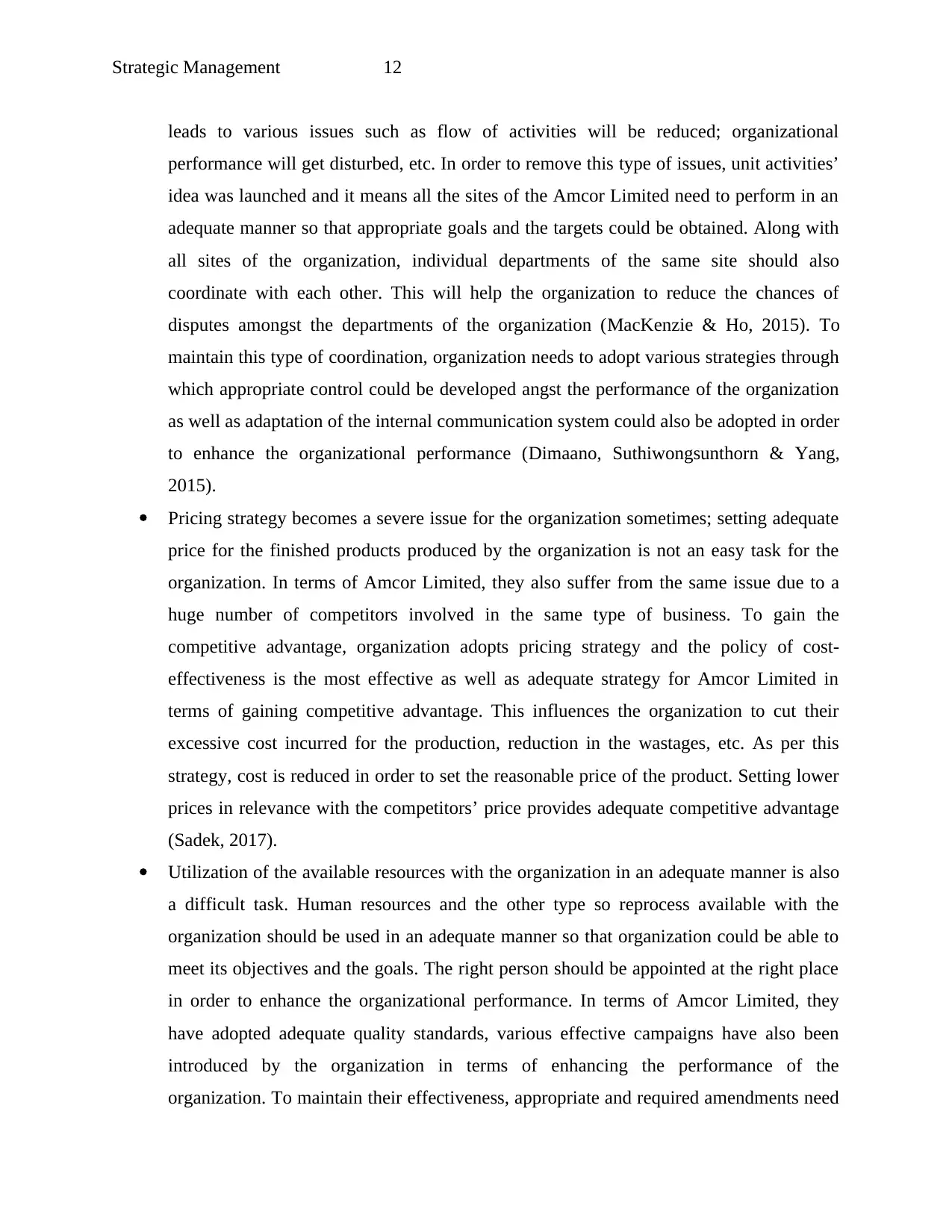
Strategic Management 12
leads to various issues such as flow of activities will be reduced; organizational
performance will get disturbed, etc. In order to remove this type of issues, unit activities’
idea was launched and it means all the sites of the Amcor Limited need to perform in an
adequate manner so that appropriate goals and the targets could be obtained. Along with
all sites of the organization, individual departments of the same site should also
coordinate with each other. This will help the organization to reduce the chances of
disputes amongst the departments of the organization (MacKenzie & Ho, 2015). To
maintain this type of coordination, organization needs to adopt various strategies through
which appropriate control could be developed angst the performance of the organization
as well as adaptation of the internal communication system could also be adopted in order
to enhance the organizational performance (Dimaano, Suthiwongsunthorn & Yang,
2015).
Pricing strategy becomes a severe issue for the organization sometimes; setting adequate
price for the finished products produced by the organization is not an easy task for the
organization. In terms of Amcor Limited, they also suffer from the same issue due to a
huge number of competitors involved in the same type of business. To gain the
competitive advantage, organization adopts pricing strategy and the policy of cost-
effectiveness is the most effective as well as adequate strategy for Amcor Limited in
terms of gaining competitive advantage. This influences the organization to cut their
excessive cost incurred for the production, reduction in the wastages, etc. As per this
strategy, cost is reduced in order to set the reasonable price of the product. Setting lower
prices in relevance with the competitors’ price provides adequate competitive advantage
(Sadek, 2017).
Utilization of the available resources with the organization in an adequate manner is also
a difficult task. Human resources and the other type so reprocess available with the
organization should be used in an adequate manner so that organization could be able to
meet its objectives and the goals. The right person should be appointed at the right place
in order to enhance the organizational performance. In terms of Amcor Limited, they
have adopted adequate quality standards, various effective campaigns have also been
introduced by the organization in terms of enhancing the performance of the
organization. To maintain their effectiveness, appropriate and required amendments need
leads to various issues such as flow of activities will be reduced; organizational
performance will get disturbed, etc. In order to remove this type of issues, unit activities’
idea was launched and it means all the sites of the Amcor Limited need to perform in an
adequate manner so that appropriate goals and the targets could be obtained. Along with
all sites of the organization, individual departments of the same site should also
coordinate with each other. This will help the organization to reduce the chances of
disputes amongst the departments of the organization (MacKenzie & Ho, 2015). To
maintain this type of coordination, organization needs to adopt various strategies through
which appropriate control could be developed angst the performance of the organization
as well as adaptation of the internal communication system could also be adopted in order
to enhance the organizational performance (Dimaano, Suthiwongsunthorn & Yang,
2015).
Pricing strategy becomes a severe issue for the organization sometimes; setting adequate
price for the finished products produced by the organization is not an easy task for the
organization. In terms of Amcor Limited, they also suffer from the same issue due to a
huge number of competitors involved in the same type of business. To gain the
competitive advantage, organization adopts pricing strategy and the policy of cost-
effectiveness is the most effective as well as adequate strategy for Amcor Limited in
terms of gaining competitive advantage. This influences the organization to cut their
excessive cost incurred for the production, reduction in the wastages, etc. As per this
strategy, cost is reduced in order to set the reasonable price of the product. Setting lower
prices in relevance with the competitors’ price provides adequate competitive advantage
(Sadek, 2017).
Utilization of the available resources with the organization in an adequate manner is also
a difficult task. Human resources and the other type so reprocess available with the
organization should be used in an adequate manner so that organization could be able to
meet its objectives and the goals. The right person should be appointed at the right place
in order to enhance the organizational performance. In terms of Amcor Limited, they
have adopted adequate quality standards, various effective campaigns have also been
introduced by the organization in terms of enhancing the performance of the
organization. To maintain their effectiveness, appropriate and required amendments need
Paraphrase This Document
Need a fresh take? Get an instant paraphrase of this document with our AI Paraphraser
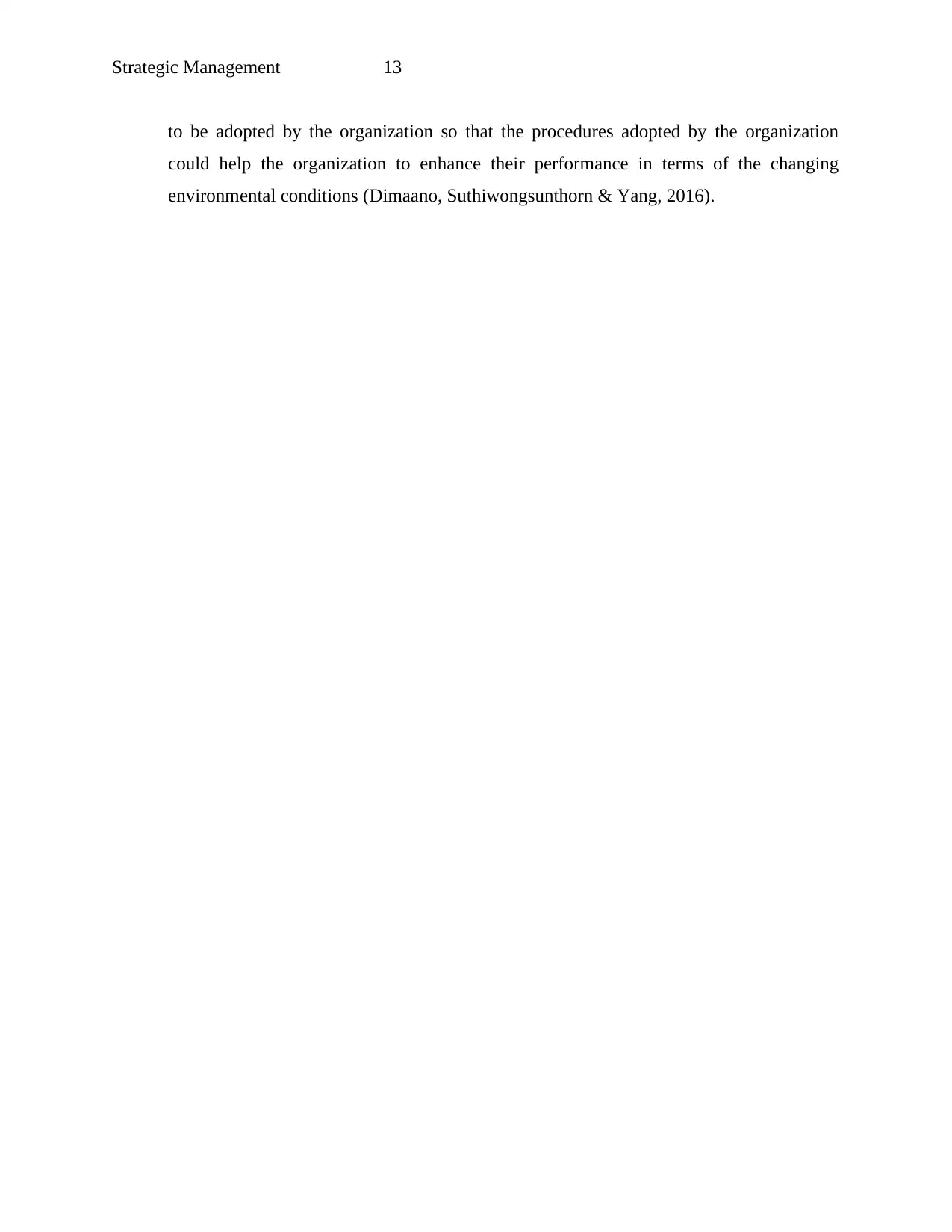
Strategic Management 13
to be adopted by the organization so that the procedures adopted by the organization
could help the organization to enhance their performance in terms of the changing
environmental conditions (Dimaano, Suthiwongsunthorn & Yang, 2016).
to be adopted by the organization so that the procedures adopted by the organization
could help the organization to enhance their performance in terms of the changing
environmental conditions (Dimaano, Suthiwongsunthorn & Yang, 2016).
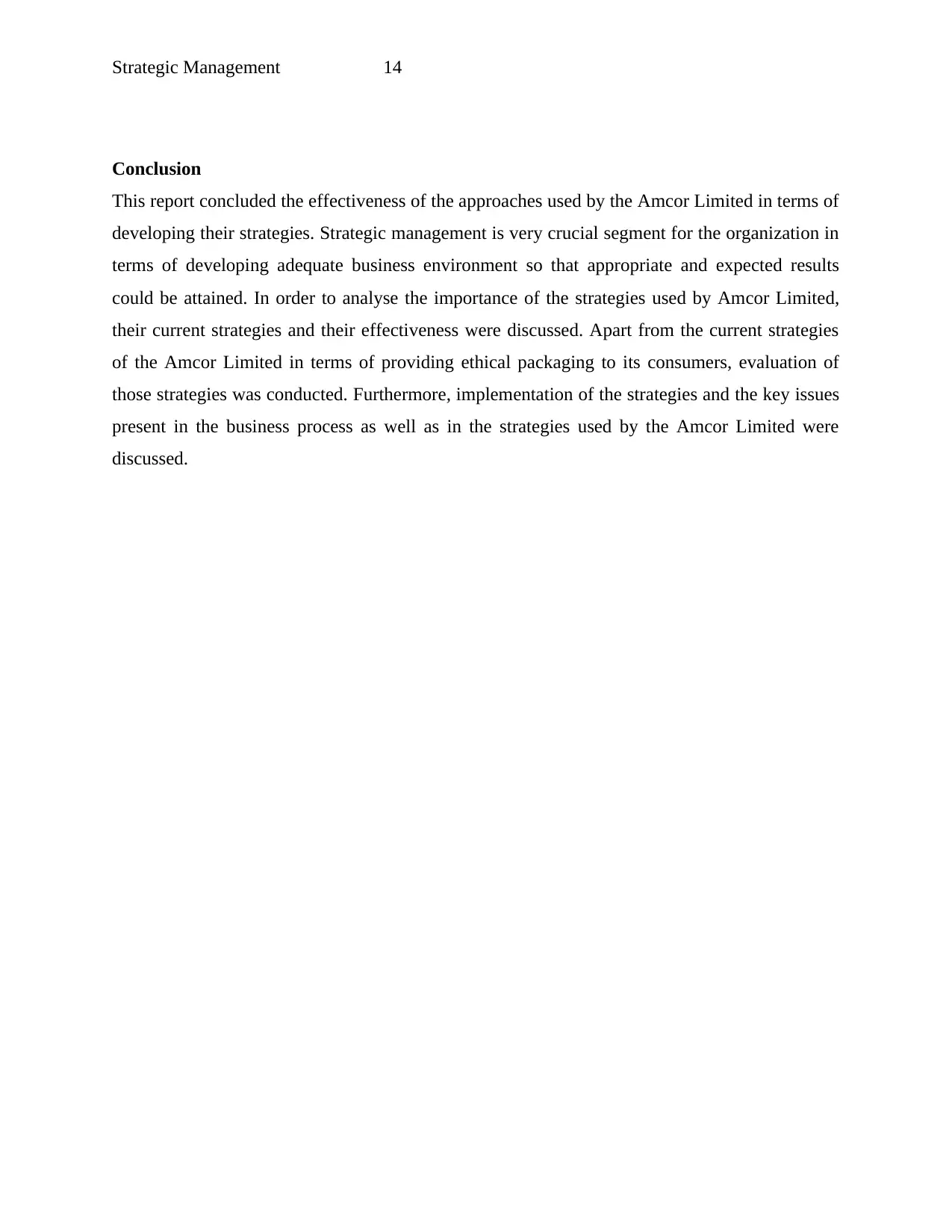
Strategic Management 14
Conclusion
This report concluded the effectiveness of the approaches used by the Amcor Limited in terms of
developing their strategies. Strategic management is very crucial segment for the organization in
terms of developing adequate business environment so that appropriate and expected results
could be attained. In order to analyse the importance of the strategies used by Amcor Limited,
their current strategies and their effectiveness were discussed. Apart from the current strategies
of the Amcor Limited in terms of providing ethical packaging to its consumers, evaluation of
those strategies was conducted. Furthermore, implementation of the strategies and the key issues
present in the business process as well as in the strategies used by the Amcor Limited were
discussed.
Conclusion
This report concluded the effectiveness of the approaches used by the Amcor Limited in terms of
developing their strategies. Strategic management is very crucial segment for the organization in
terms of developing adequate business environment so that appropriate and expected results
could be attained. In order to analyse the importance of the strategies used by Amcor Limited,
their current strategies and their effectiveness were discussed. Apart from the current strategies
of the Amcor Limited in terms of providing ethical packaging to its consumers, evaluation of
those strategies was conducted. Furthermore, implementation of the strategies and the key issues
present in the business process as well as in the strategies used by the Amcor Limited were
discussed.
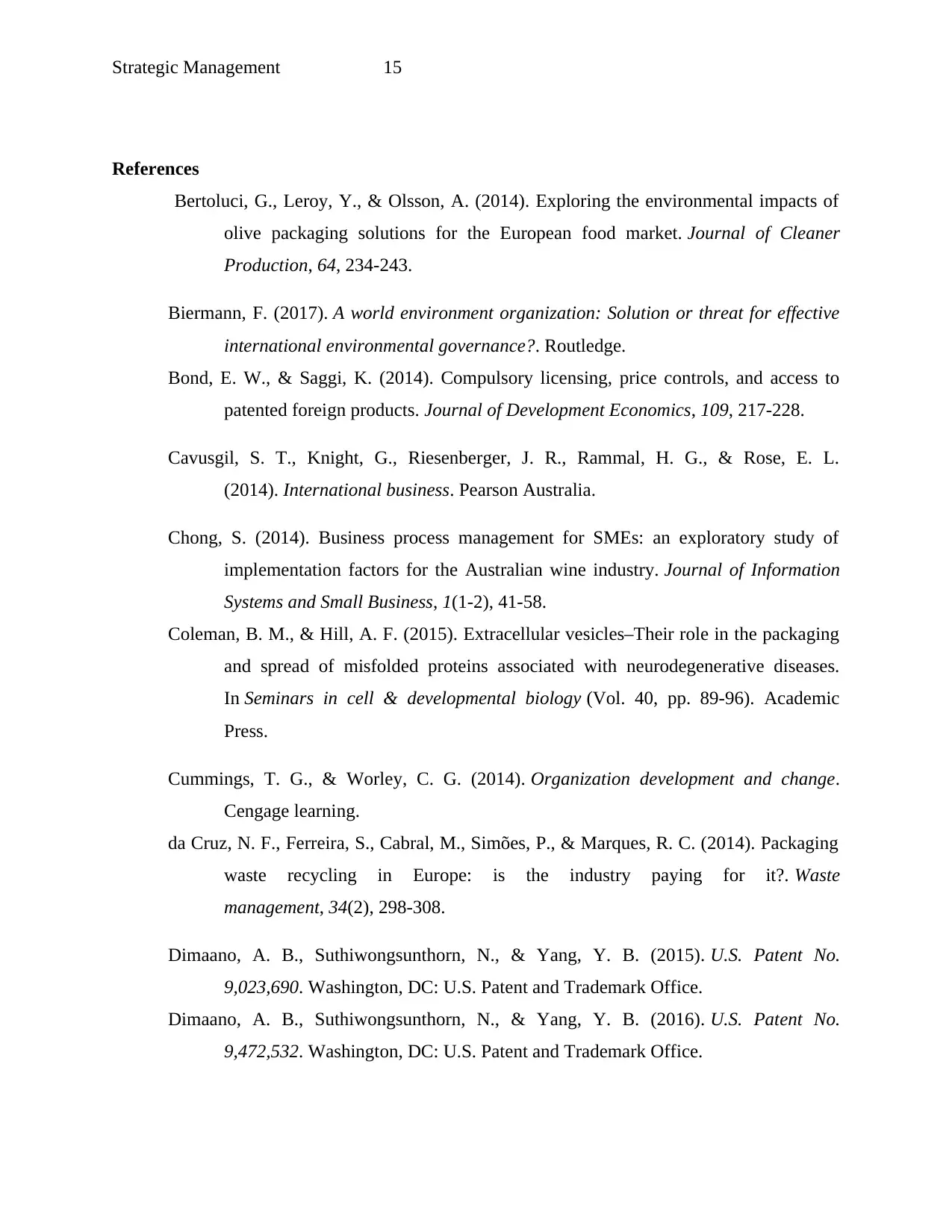
Strategic Management 15
References
Bertoluci, G., Leroy, Y., & Olsson, A. (2014). Exploring the environmental impacts of
olive packaging solutions for the European food market. Journal of Cleaner
Production, 64, 234-243.
Biermann, F. (2017). A world environment organization: Solution or threat for effective
international environmental governance?. Routledge.
Bond, E. W., & Saggi, K. (2014). Compulsory licensing, price controls, and access to
patented foreign products. Journal of Development Economics, 109, 217-228.
Cavusgil, S. T., Knight, G., Riesenberger, J. R., Rammal, H. G., & Rose, E. L.
(2014). International business. Pearson Australia.
Chong, S. (2014). Business process management for SMEs: an exploratory study of
implementation factors for the Australian wine industry. Journal of Information
Systems and Small Business, 1(1-2), 41-58.
Coleman, B. M., & Hill, A. F. (2015). Extracellular vesicles–Their role in the packaging
and spread of misfolded proteins associated with neurodegenerative diseases.
In Seminars in cell & developmental biology (Vol. 40, pp. 89-96). Academic
Press.
Cummings, T. G., & Worley, C. G. (2014). Organization development and change.
Cengage learning.
da Cruz, N. F., Ferreira, S., Cabral, M., Simões, P., & Marques, R. C. (2014). Packaging
waste recycling in Europe: is the industry paying for it?. Waste
management, 34(2), 298-308.
Dimaano, A. B., Suthiwongsunthorn, N., & Yang, Y. B. (2015). U.S. Patent No.
9,023,690. Washington, DC: U.S. Patent and Trademark Office.
Dimaano, A. B., Suthiwongsunthorn, N., & Yang, Y. B. (2016). U.S. Patent No.
9,472,532. Washington, DC: U.S. Patent and Trademark Office.
References
Bertoluci, G., Leroy, Y., & Olsson, A. (2014). Exploring the environmental impacts of
olive packaging solutions for the European food market. Journal of Cleaner
Production, 64, 234-243.
Biermann, F. (2017). A world environment organization: Solution or threat for effective
international environmental governance?. Routledge.
Bond, E. W., & Saggi, K. (2014). Compulsory licensing, price controls, and access to
patented foreign products. Journal of Development Economics, 109, 217-228.
Cavusgil, S. T., Knight, G., Riesenberger, J. R., Rammal, H. G., & Rose, E. L.
(2014). International business. Pearson Australia.
Chong, S. (2014). Business process management for SMEs: an exploratory study of
implementation factors for the Australian wine industry. Journal of Information
Systems and Small Business, 1(1-2), 41-58.
Coleman, B. M., & Hill, A. F. (2015). Extracellular vesicles–Their role in the packaging
and spread of misfolded proteins associated with neurodegenerative diseases.
In Seminars in cell & developmental biology (Vol. 40, pp. 89-96). Academic
Press.
Cummings, T. G., & Worley, C. G. (2014). Organization development and change.
Cengage learning.
da Cruz, N. F., Ferreira, S., Cabral, M., Simões, P., & Marques, R. C. (2014). Packaging
waste recycling in Europe: is the industry paying for it?. Waste
management, 34(2), 298-308.
Dimaano, A. B., Suthiwongsunthorn, N., & Yang, Y. B. (2015). U.S. Patent No.
9,023,690. Washington, DC: U.S. Patent and Trademark Office.
Dimaano, A. B., Suthiwongsunthorn, N., & Yang, Y. B. (2016). U.S. Patent No.
9,472,532. Washington, DC: U.S. Patent and Trademark Office.
Secure Best Marks with AI Grader
Need help grading? Try our AI Grader for instant feedback on your assignments.
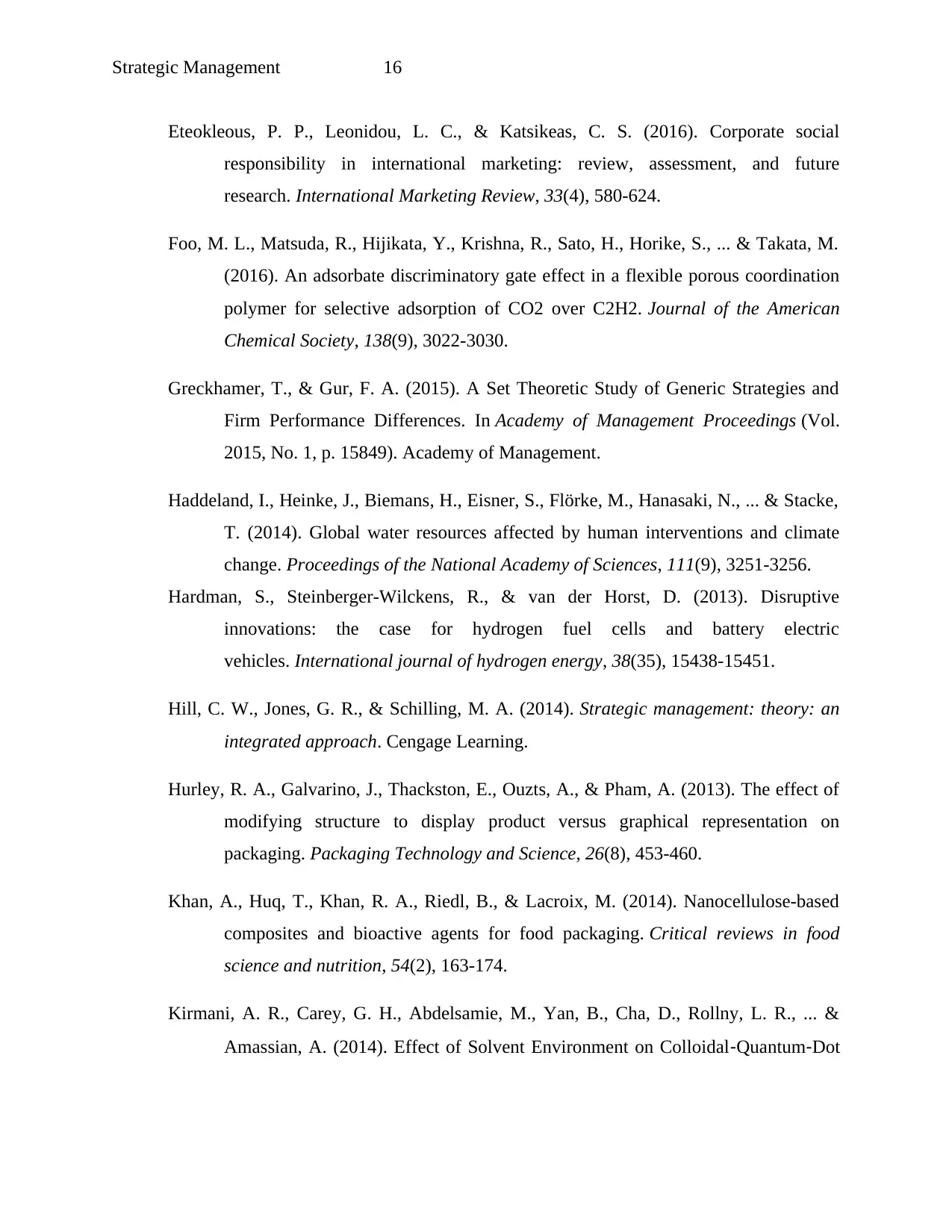
Strategic Management 16
Eteokleous, P. P., Leonidou, L. C., & Katsikeas, C. S. (2016). Corporate social
responsibility in international marketing: review, assessment, and future
research. International Marketing Review, 33(4), 580-624.
Foo, M. L., Matsuda, R., Hijikata, Y., Krishna, R., Sato, H., Horike, S., ... & Takata, M.
(2016). An adsorbate discriminatory gate effect in a flexible porous coordination
polymer for selective adsorption of CO2 over C2H2. Journal of the American
Chemical Society, 138(9), 3022-3030.
Greckhamer, T., & Gur, F. A. (2015). A Set Theoretic Study of Generic Strategies and
Firm Performance Differences. In Academy of Management Proceedings (Vol.
2015, No. 1, p. 15849). Academy of Management.
Haddeland, I., Heinke, J., Biemans, H., Eisner, S., Flörke, M., Hanasaki, N., ... & Stacke,
T. (2014). Global water resources affected by human interventions and climate
change. Proceedings of the National Academy of Sciences, 111(9), 3251-3256.
Hardman, S., Steinberger-Wilckens, R., & van der Horst, D. (2013). Disruptive
innovations: the case for hydrogen fuel cells and battery electric
vehicles. International journal of hydrogen energy, 38(35), 15438-15451.
Hill, C. W., Jones, G. R., & Schilling, M. A. (2014). Strategic management: theory: an
integrated approach. Cengage Learning.
Hurley, R. A., Galvarino, J., Thackston, E., Ouzts, A., & Pham, A. (2013). The effect of
modifying structure to display product versus graphical representation on
packaging. Packaging Technology and Science, 26(8), 453-460.
Khan, A., Huq, T., Khan, R. A., Riedl, B., & Lacroix, M. (2014). Nanocellulose-based
composites and bioactive agents for food packaging. Critical reviews in food
science and nutrition, 54(2), 163-174.
Kirmani, A. R., Carey, G. H., Abdelsamie, M., Yan, B., Cha, D., Rollny, L. R., ... &
Amassian, A. (2014). Effect of Solvent Environment on Colloidal‐Quantum‐Dot
Eteokleous, P. P., Leonidou, L. C., & Katsikeas, C. S. (2016). Corporate social
responsibility in international marketing: review, assessment, and future
research. International Marketing Review, 33(4), 580-624.
Foo, M. L., Matsuda, R., Hijikata, Y., Krishna, R., Sato, H., Horike, S., ... & Takata, M.
(2016). An adsorbate discriminatory gate effect in a flexible porous coordination
polymer for selective adsorption of CO2 over C2H2. Journal of the American
Chemical Society, 138(9), 3022-3030.
Greckhamer, T., & Gur, F. A. (2015). A Set Theoretic Study of Generic Strategies and
Firm Performance Differences. In Academy of Management Proceedings (Vol.
2015, No. 1, p. 15849). Academy of Management.
Haddeland, I., Heinke, J., Biemans, H., Eisner, S., Flörke, M., Hanasaki, N., ... & Stacke,
T. (2014). Global water resources affected by human interventions and climate
change. Proceedings of the National Academy of Sciences, 111(9), 3251-3256.
Hardman, S., Steinberger-Wilckens, R., & van der Horst, D. (2013). Disruptive
innovations: the case for hydrogen fuel cells and battery electric
vehicles. International journal of hydrogen energy, 38(35), 15438-15451.
Hill, C. W., Jones, G. R., & Schilling, M. A. (2014). Strategic management: theory: an
integrated approach. Cengage Learning.
Hurley, R. A., Galvarino, J., Thackston, E., Ouzts, A., & Pham, A. (2013). The effect of
modifying structure to display product versus graphical representation on
packaging. Packaging Technology and Science, 26(8), 453-460.
Khan, A., Huq, T., Khan, R. A., Riedl, B., & Lacroix, M. (2014). Nanocellulose-based
composites and bioactive agents for food packaging. Critical reviews in food
science and nutrition, 54(2), 163-174.
Kirmani, A. R., Carey, G. H., Abdelsamie, M., Yan, B., Cha, D., Rollny, L. R., ... &
Amassian, A. (2014). Effect of Solvent Environment on Colloidal‐Quantum‐Dot
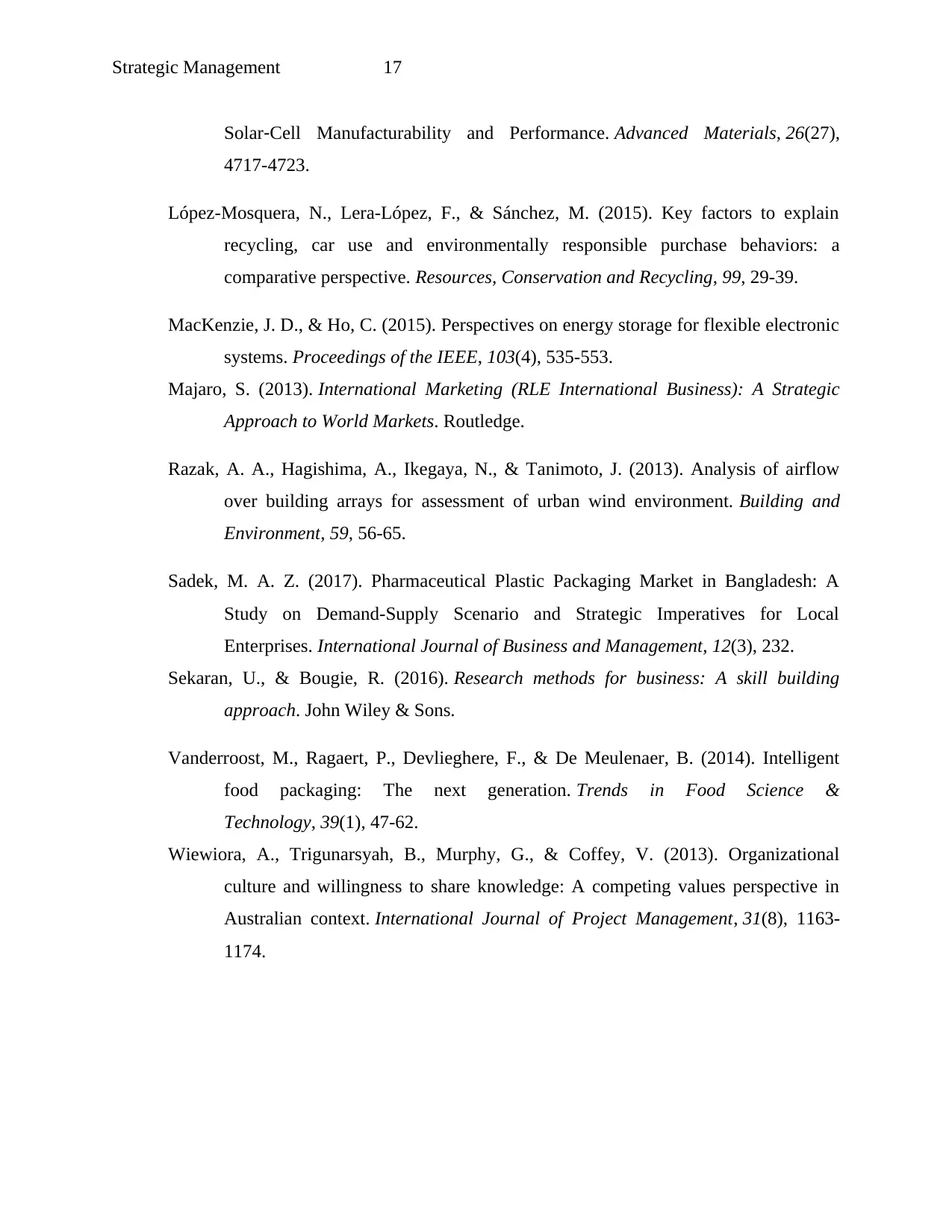
Strategic Management 17
Solar‐Cell Manufacturability and Performance. Advanced Materials, 26(27),
4717-4723.
López-Mosquera, N., Lera-López, F., & Sánchez, M. (2015). Key factors to explain
recycling, car use and environmentally responsible purchase behaviors: a
comparative perspective. Resources, Conservation and Recycling, 99, 29-39.
MacKenzie, J. D., & Ho, C. (2015). Perspectives on energy storage for flexible electronic
systems. Proceedings of the IEEE, 103(4), 535-553.
Majaro, S. (2013). International Marketing (RLE International Business): A Strategic
Approach to World Markets. Routledge.
Razak, A. A., Hagishima, A., Ikegaya, N., & Tanimoto, J. (2013). Analysis of airflow
over building arrays for assessment of urban wind environment. Building and
Environment, 59, 56-65.
Sadek, M. A. Z. (2017). Pharmaceutical Plastic Packaging Market in Bangladesh: A
Study on Demand-Supply Scenario and Strategic Imperatives for Local
Enterprises. International Journal of Business and Management, 12(3), 232.
Sekaran, U., & Bougie, R. (2016). Research methods for business: A skill building
approach. John Wiley & Sons.
Vanderroost, M., Ragaert, P., Devlieghere, F., & De Meulenaer, B. (2014). Intelligent
food packaging: The next generation. Trends in Food Science &
Technology, 39(1), 47-62.
Wiewiora, A., Trigunarsyah, B., Murphy, G., & Coffey, V. (2013). Organizational
culture and willingness to share knowledge: A competing values perspective in
Australian context. International Journal of Project Management, 31(8), 1163-
1174.
Solar‐Cell Manufacturability and Performance. Advanced Materials, 26(27),
4717-4723.
López-Mosquera, N., Lera-López, F., & Sánchez, M. (2015). Key factors to explain
recycling, car use and environmentally responsible purchase behaviors: a
comparative perspective. Resources, Conservation and Recycling, 99, 29-39.
MacKenzie, J. D., & Ho, C. (2015). Perspectives on energy storage for flexible electronic
systems. Proceedings of the IEEE, 103(4), 535-553.
Majaro, S. (2013). International Marketing (RLE International Business): A Strategic
Approach to World Markets. Routledge.
Razak, A. A., Hagishima, A., Ikegaya, N., & Tanimoto, J. (2013). Analysis of airflow
over building arrays for assessment of urban wind environment. Building and
Environment, 59, 56-65.
Sadek, M. A. Z. (2017). Pharmaceutical Plastic Packaging Market in Bangladesh: A
Study on Demand-Supply Scenario and Strategic Imperatives for Local
Enterprises. International Journal of Business and Management, 12(3), 232.
Sekaran, U., & Bougie, R. (2016). Research methods for business: A skill building
approach. John Wiley & Sons.
Vanderroost, M., Ragaert, P., Devlieghere, F., & De Meulenaer, B. (2014). Intelligent
food packaging: The next generation. Trends in Food Science &
Technology, 39(1), 47-62.
Wiewiora, A., Trigunarsyah, B., Murphy, G., & Coffey, V. (2013). Organizational
culture and willingness to share knowledge: A competing values perspective in
Australian context. International Journal of Project Management, 31(8), 1163-
1174.
1 out of 18
Your All-in-One AI-Powered Toolkit for Academic Success.
+13062052269
info@desklib.com
Available 24*7 on WhatsApp / Email
![[object Object]](/_next/static/media/star-bottom.7253800d.svg)
Unlock your academic potential
© 2024 | Zucol Services PVT LTD | All rights reserved.





